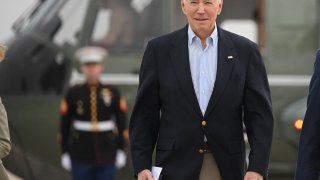
This was CNBC's live blog tracking developments on the war in Ukraine on March 31, 2023. See here for the latest updates.
Turkey's Parliament unanimously approved Finland's membership to NATO, clearing the final hurdle for the Nordic country's ascension to the 74-year old defense alliance. Ankara is still holding out on Sweden's membership, however.
The step for Finland, which comes after months of stalling by NATO members Turkey and Hungary, marks a historic foreign policy shift and a significant setback for Russia, which often refers to NATO's expansion as an existential threat. Finland's addition to the alliance will add 830 miles of NATO territory along Russia's border.
Ukraine is marking the one-year anniversary of the Bucha massacre, during which Ukraine says retreating Russian forces killed hundreds of civilians in and around their homes in the suburb outside Kyiv. International investigators have spent the last year compiling evidence to charge Russian forces with committing atrocities, which the Kremlin denies.
Meanwhile, the White House says it has new evidence that Russia is seeking an arms-for-food deal with North Korea. Washington previously declassified intelligence revealing that Russia's mercenary Wagner Group has received weapons from North Korea to aid in its fighting in Ukraine.
Wall Street Journal reporter, Evan Gershkovich, remains detained in the Russian city of Yekaterinburg on suspicion of espionage. Russia's security service, the FSB, announced his detention Thursday and claimed without evidence that he was "collecting information constituting a state secret" at the instruction of the United States.
'Russia's war on Ukraine has thrown us back to an archaic era,' UN human rights official says
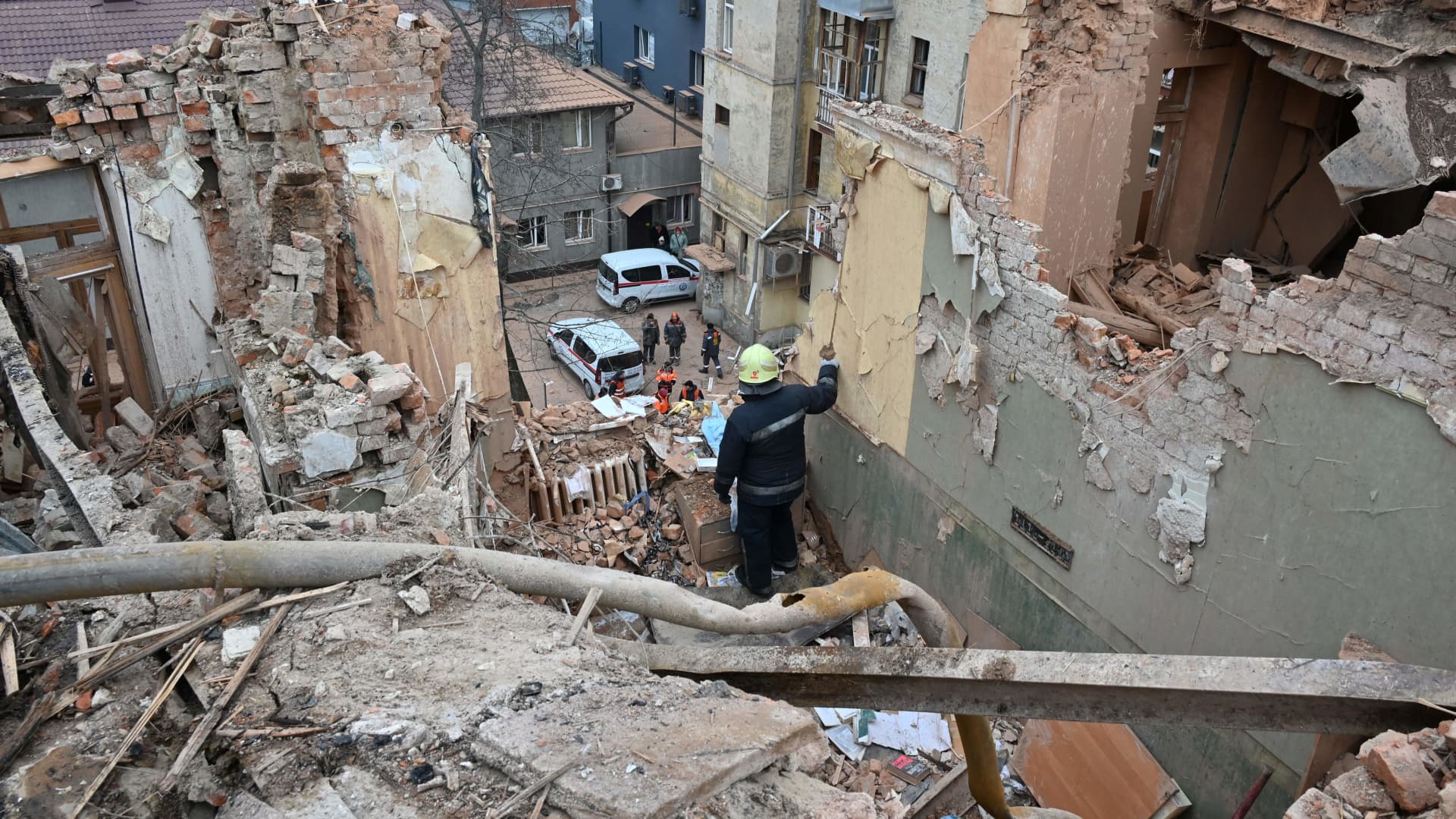
U.N. High Commissioner for Human Rights Volker Turk said Russia's war on Ukraine "has thrown us back to an archaic era."
Feeling out of the loop? We'll catch you up on the Chicago news you need to know. Sign up for the weekly> Chicago Catch-Up newsletter.
Money Report
"An era when a neighboring country's territory could be attacked and taken, at will, as one's own. When the identity and history of communities could be denied, and reality rewritten," Turk said in a speech before the U.N. Human Rights Council.
Turk said that Russia's war continues to send shockwaves across the world.
"People across the country face massive suffering and loss, deprivation, displacement and destruction. And the continuing worldwide effects of this war – including on countries without any kind of involvement – are profound," he said. "Sharp increases in the prices of food, energy, fertilizers and other essential commodities have heightened tensions and inequalities in every region," he added.
Turk called on all parties to uphold the rules of international humanitarian law especially when it comes to the protection of civilian lives, wounded soldiers as well as prisoners of war.
"Nobody is above these laws," he added.
— Amanda Macias
UN says more than 8,400 killed in Ukraine since start of war
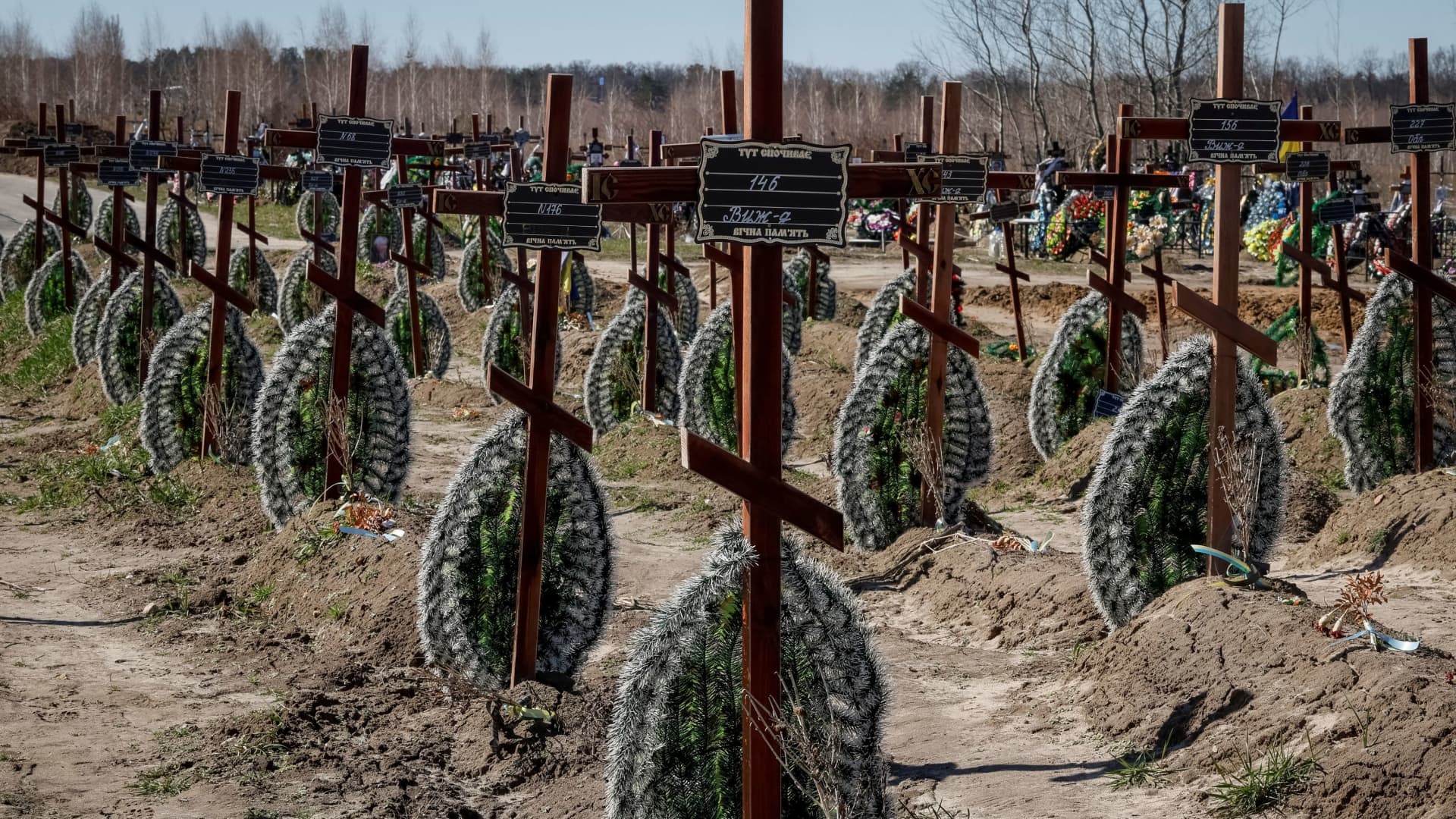
The United Nations has confirmed more than 8,400 civilian deaths and 14,000 injuries in Ukraine since Russia invaded its ex-Soviet neighbor more than a year ago.
The U.N. High Commissioner for Human Rights said the death toll in Ukraine is likely higher, because the armed conflict can delay fatality reports.
"These figures are just the tip of the iceberg. Most of the casualties resulted from the Russian forces' use of wide-impact explosive weaponry in residential neighborhoods," U.N. High Commissioner for Human Rights Volker Turk said during a speech before the U.N. Human Rights Council in Geneva.
— Amanda Macias
U.S. and Romanian forces take part in a military demonstration
U.S. and Romanian forces take part in a demonstration as part of the rotation of U.S. troops of the U.S. Army 101st Airborne division at Mihail Kogalniceanu Air Base near Constanta, Romania.
The positioning of the 101st Airborne's Army combat brigade in Romania is part of an enhanced military presence along NATO's eastern flank that has taken root in the aftermath of Russia's war on Ukraine, on a mission aimed at deterring potential aggression on NATO's southeastern flank.
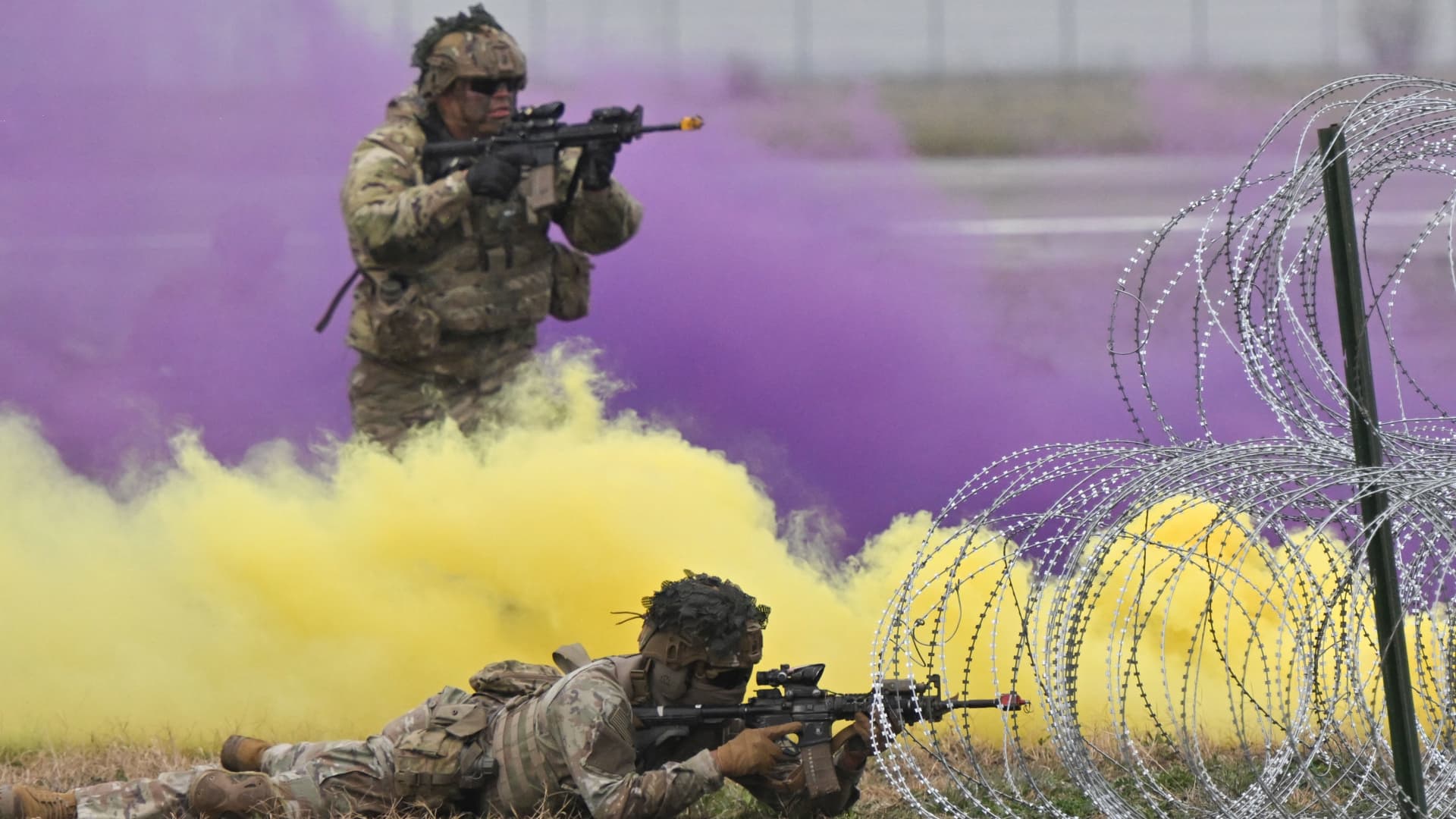
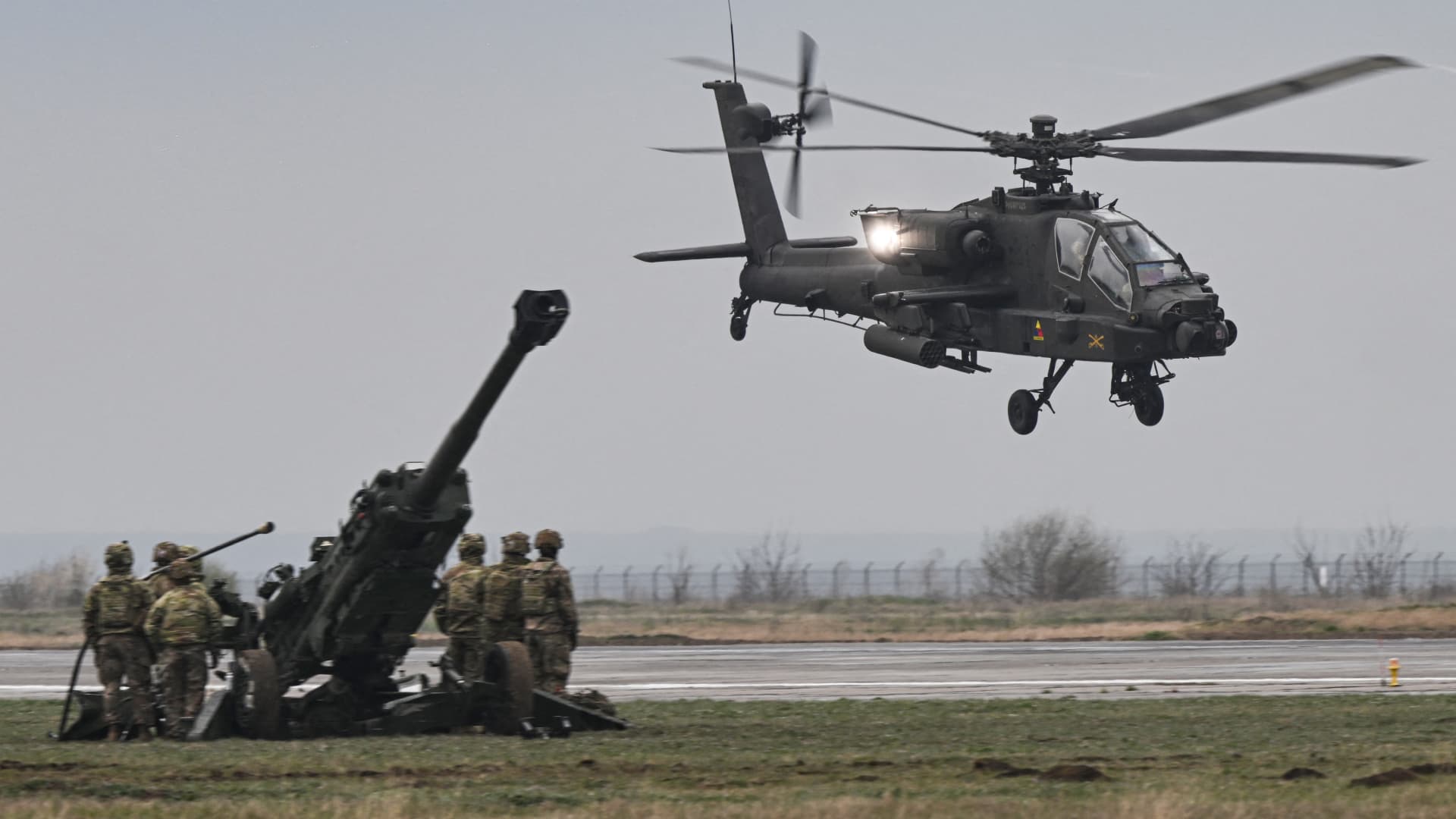
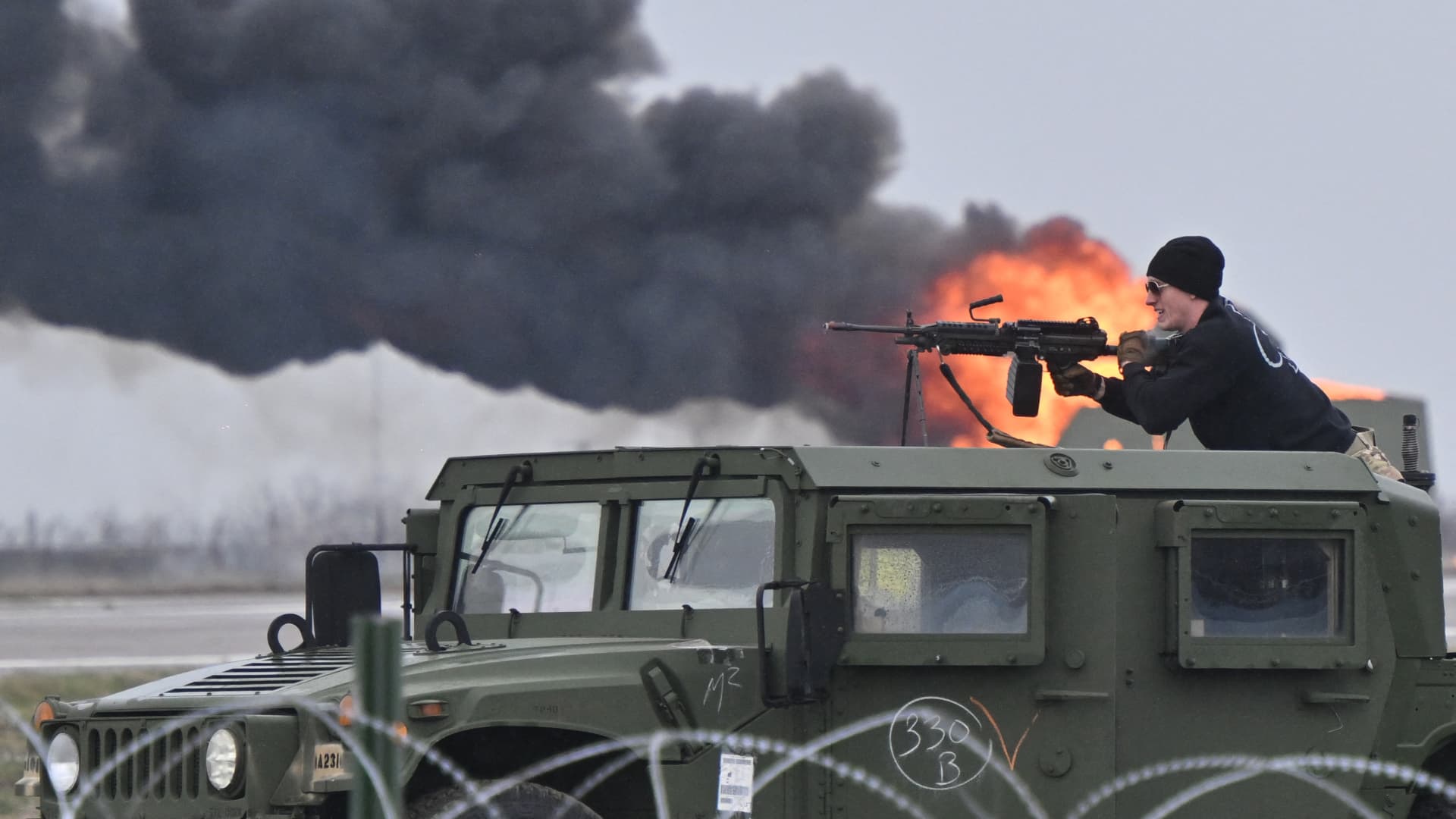
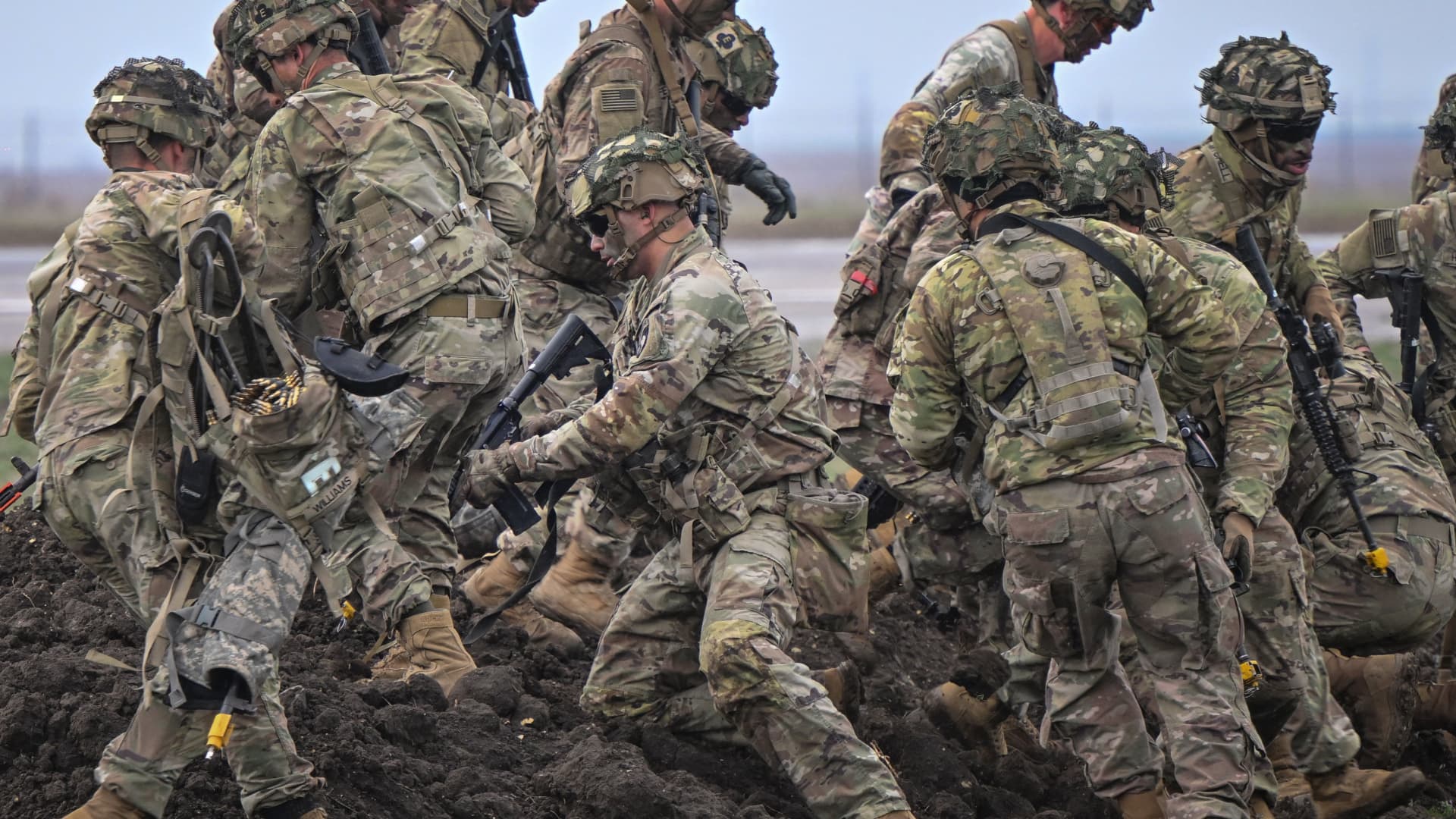
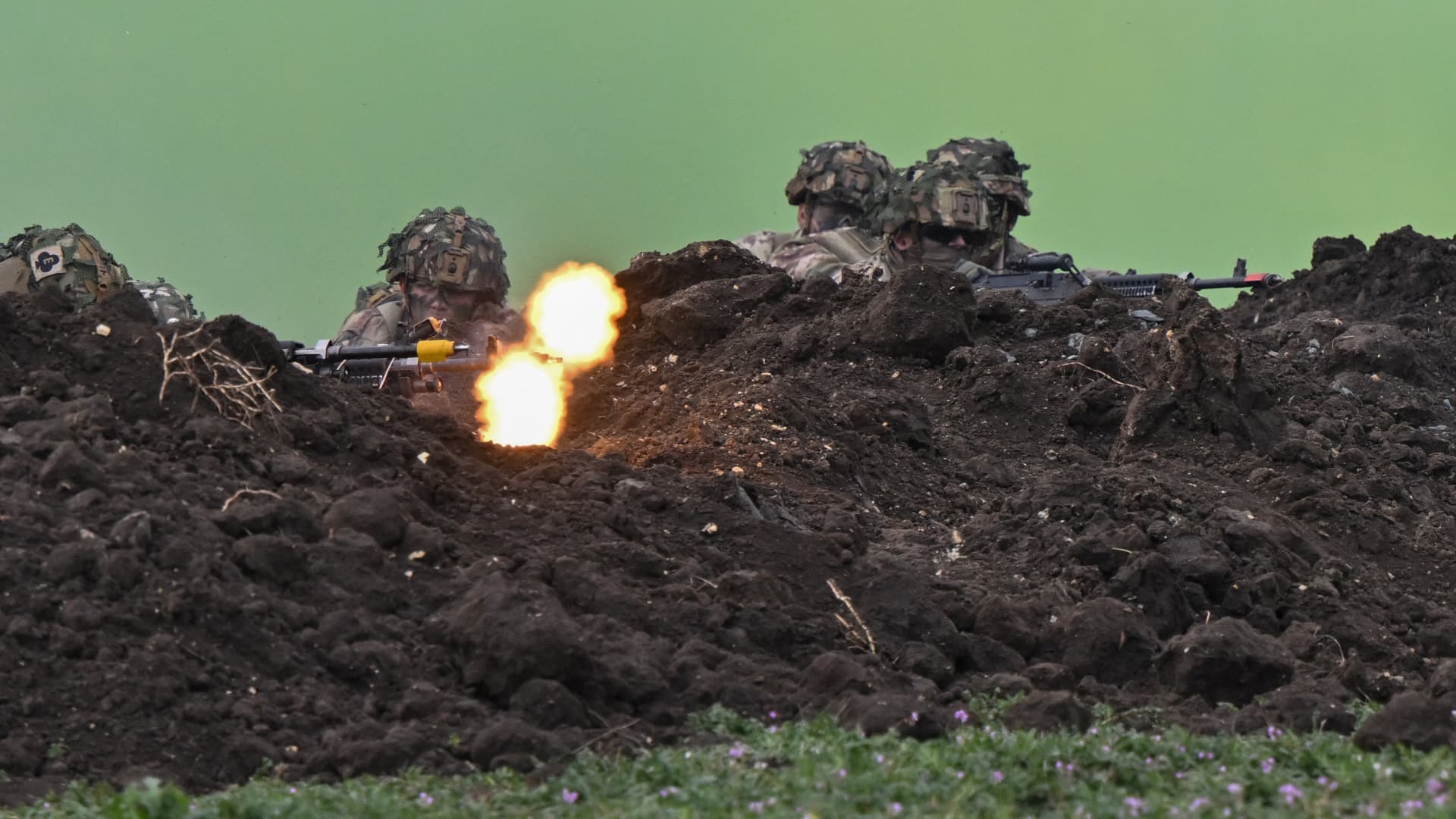
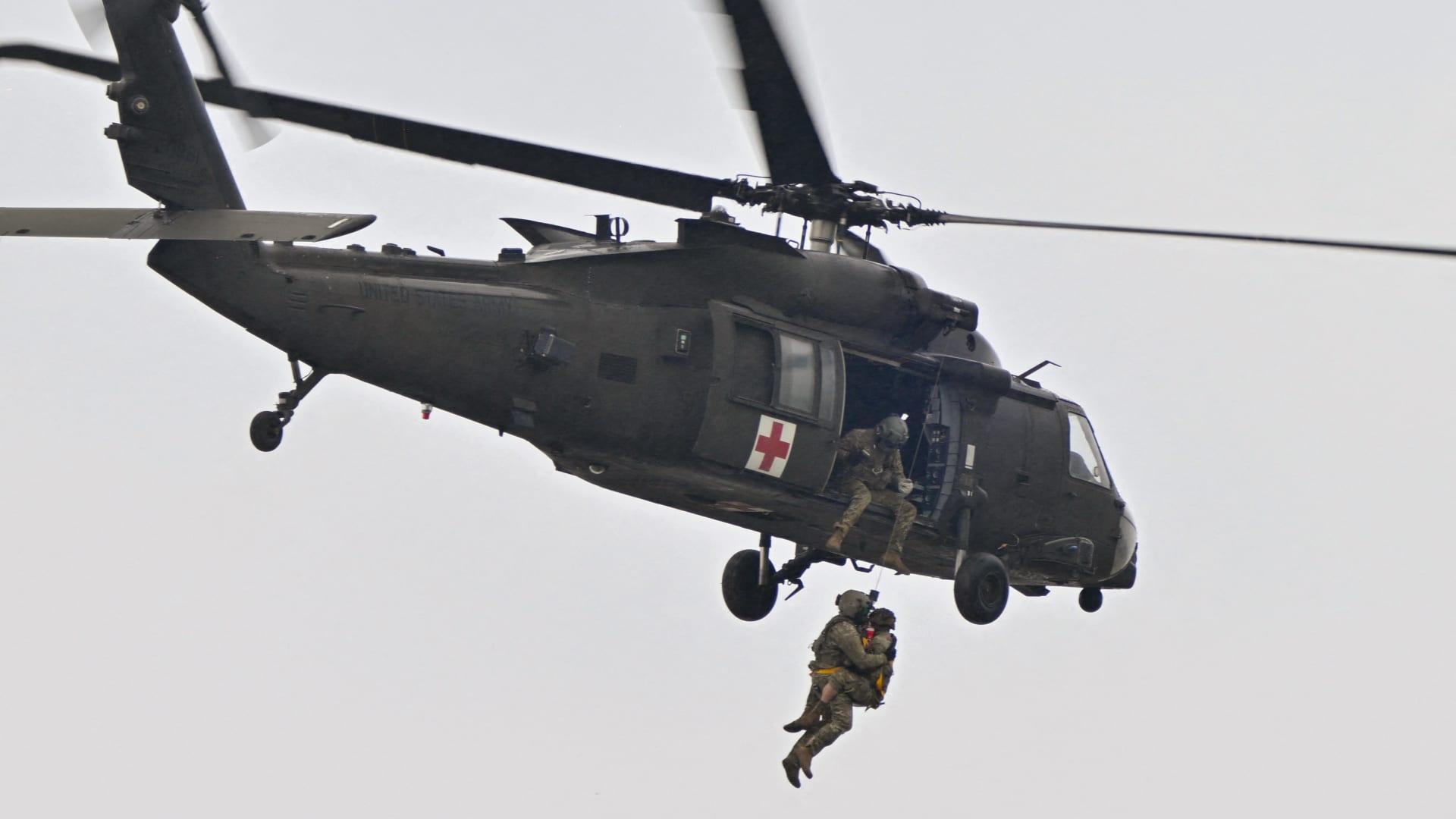
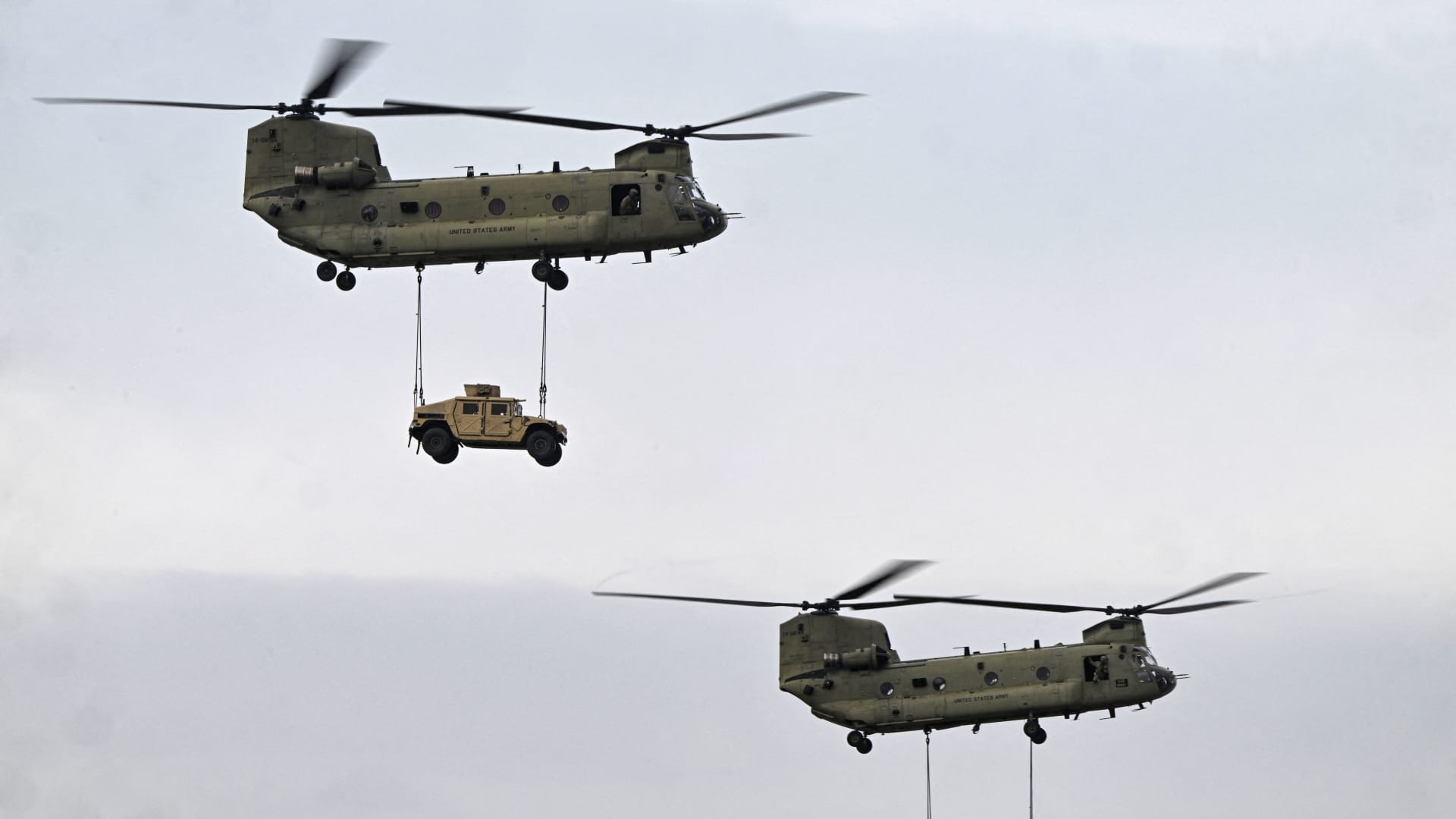
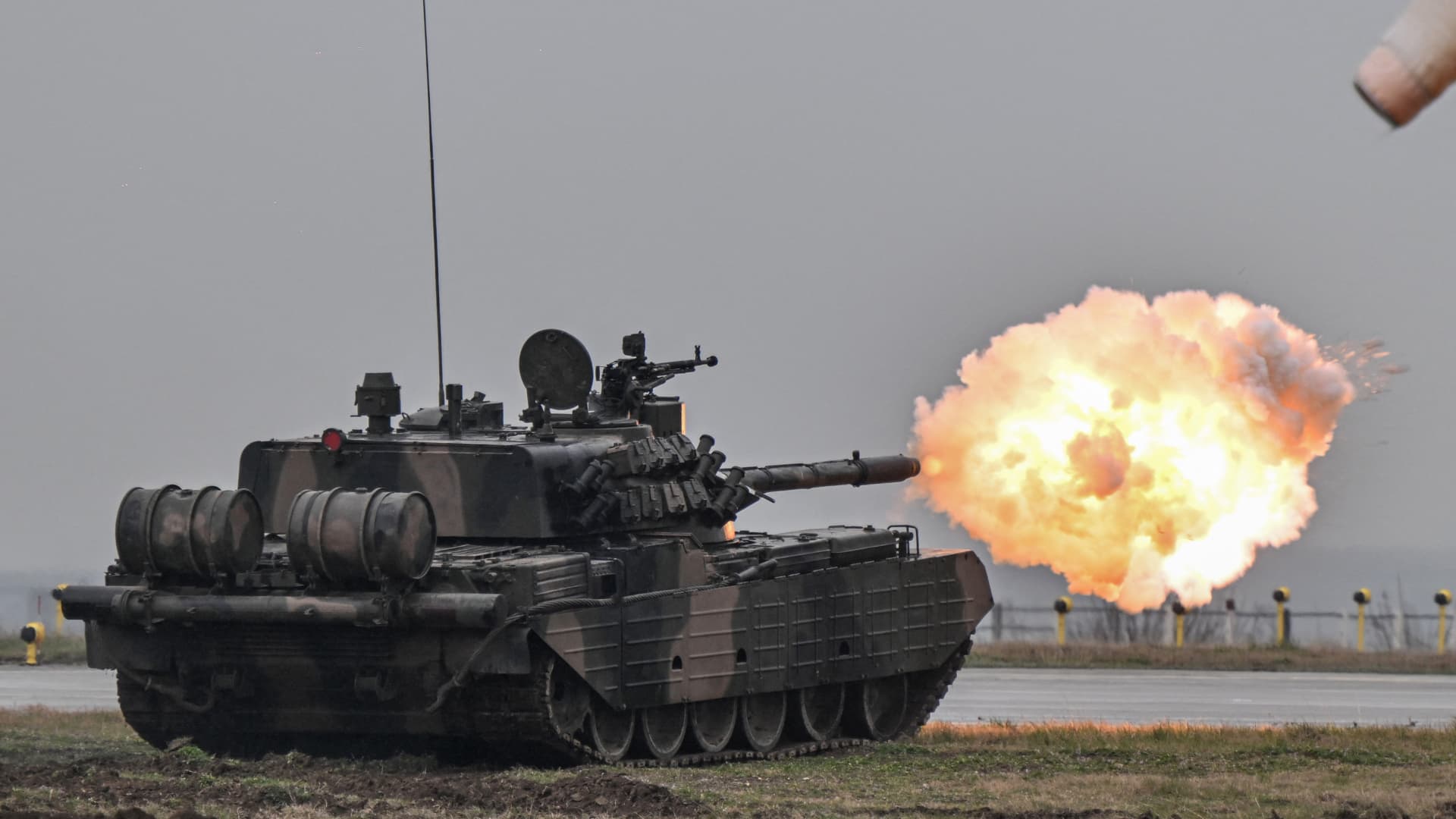
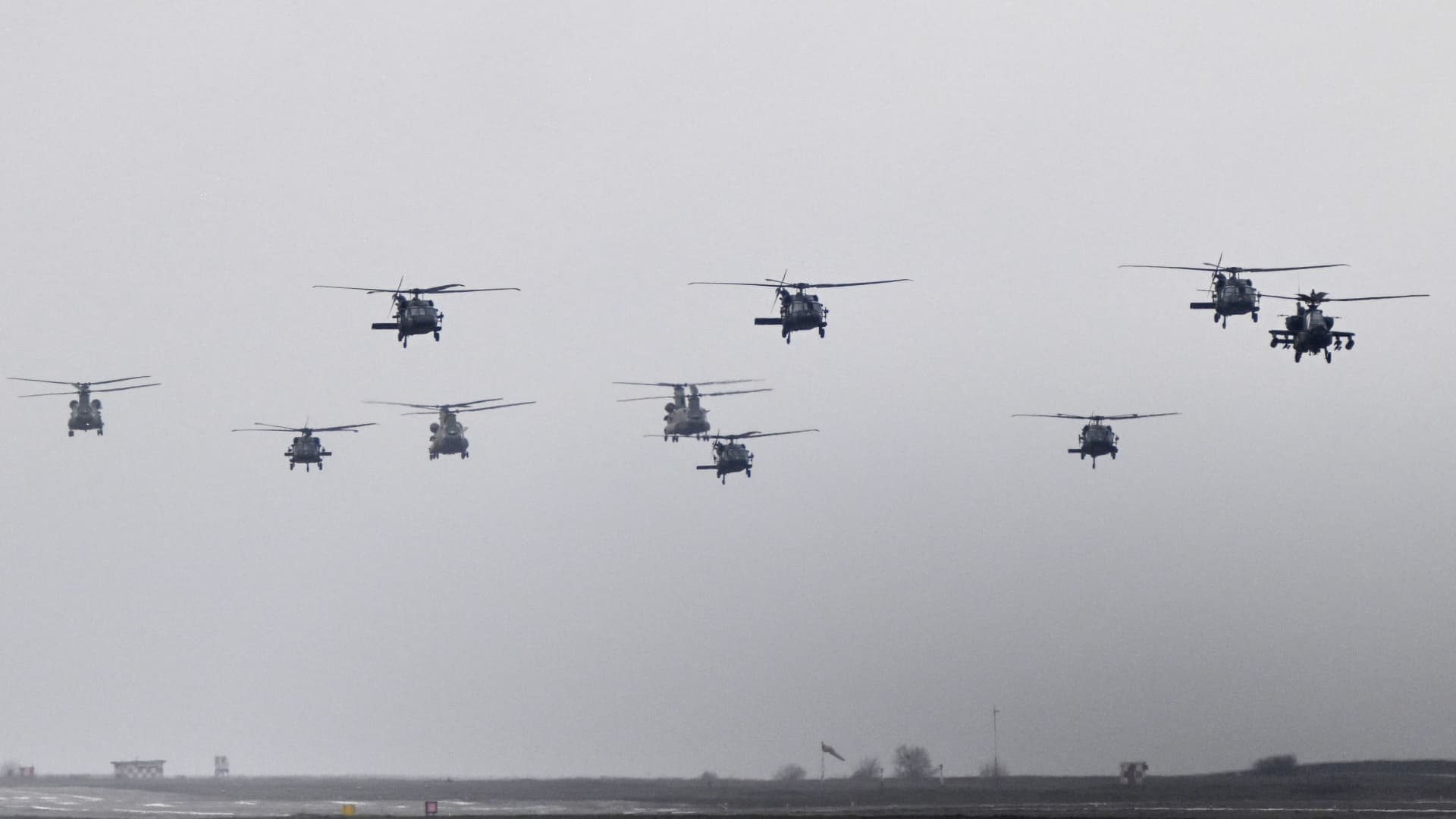
— Daniel Mihailescu | AFP | Getty Images
Newsrooms call for WSJ reporter's immediate release in new statement

Several major newsrooms called on Russia to immediately release Wall Street Journal reporter Evan Gershkovich.
"We are deeply troubled by Russia's detention of Evan Gershkovich, a respected Wall Street Journal reporter whose coverage of Russia has been fair and accurate at a time when the world needs reliable information," the newsrooms of Bloomberg, Politico, The New York Times and The Washington Post wrote in a joint statement.
"Evan's detention is intended to have a chilling effect on independent journalism and deprive the public of essential news," the newsrooms wrote.
On Thursday, a Russian court decided that Gershkovich will remain in detention until May 29.
— Amanda Macias
China could facilitate, not mediate, peace in Ukraine, EU's Borrell says
China cannot be a mediator in the war in Ukraine as it leans too much toward the invader Russia but it could play the role of facilitator to reach a peace deal with Moscow, the European Union's top diplomat, Josep Borrell, said.
"China does not distinguish between aggressor and victim of aggression," Borrell told a panel at the Spanish capital Madrid. "China doesn't call for a withdrawal of Russian troops from Ukraine."
But China should use its influence over Russia to pressure for peace in Ukraine, he added.
In Borrell's view, the only peace plan on the table is the one presented by Ukrainian President Volodymyr Zelenskyy in November, including demands to withdraw Russian troops and restore Ukraine's territory to the status quo before Russia's annexation of Crimea in 2014.
Borrell's comments echoed the call by Spanish Prime Minister Pedro Sanchez in Beijing for Chinese leader Xi Jinping to talk to the Ukrainian president and learn first-hand about Kyiv's peace formula.
— Reuters
Ukraine collects disarmed explosives that Russia fired at Kharkiv
Disarmed unexploded ordnance that Russia fired at Kharkiv is gathered at a collection point in the northeastern Ukrainian city.
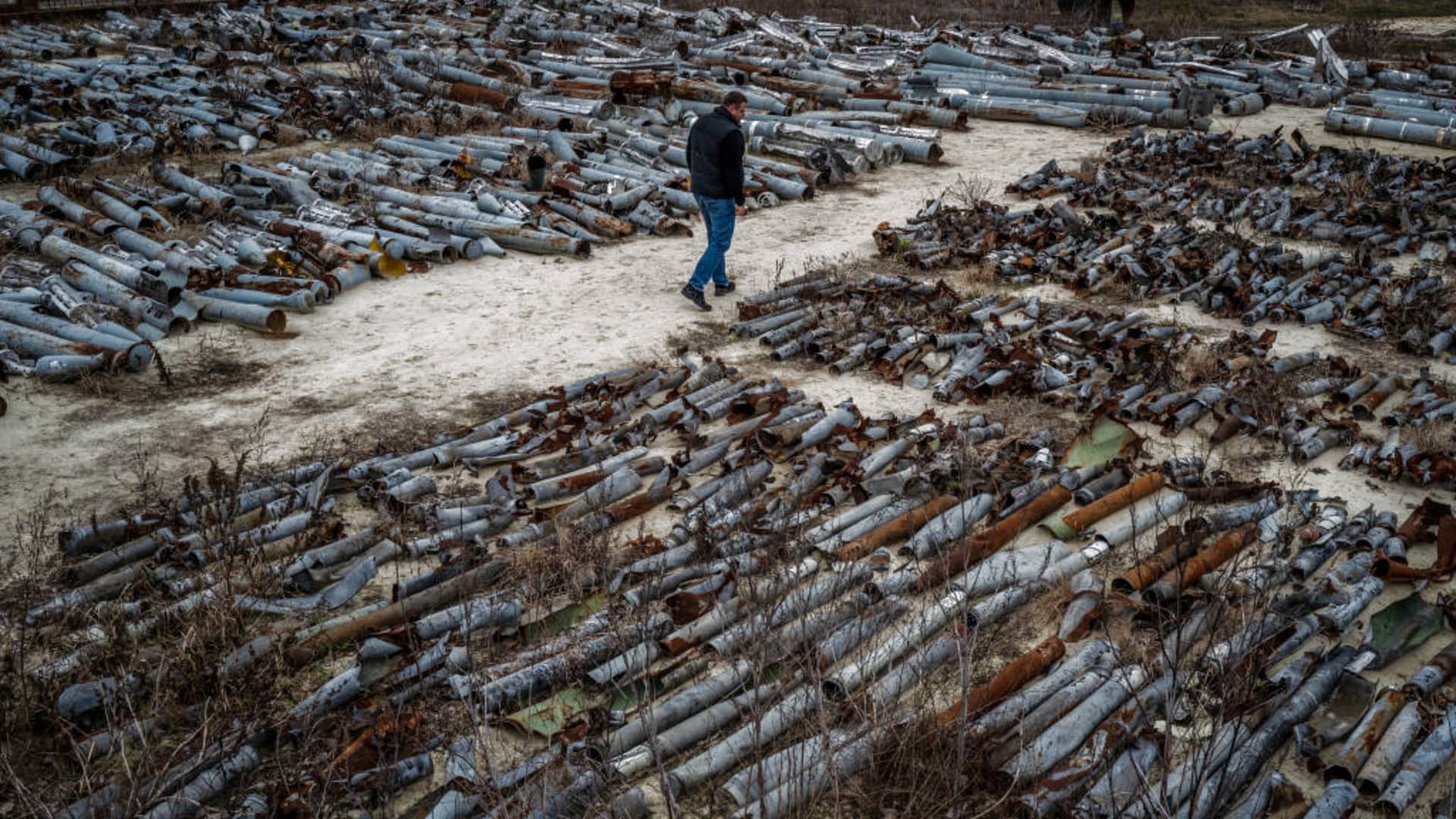
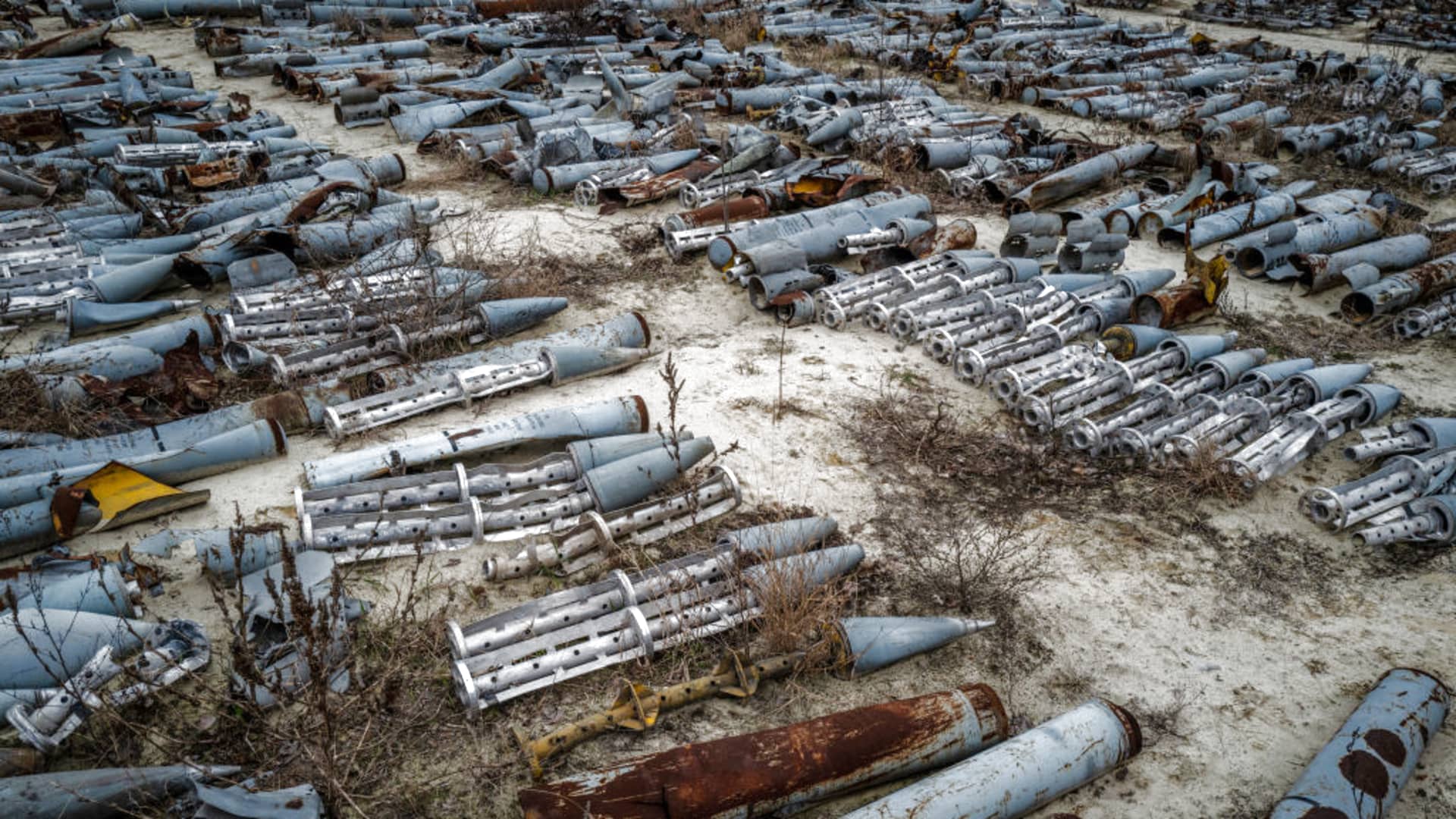
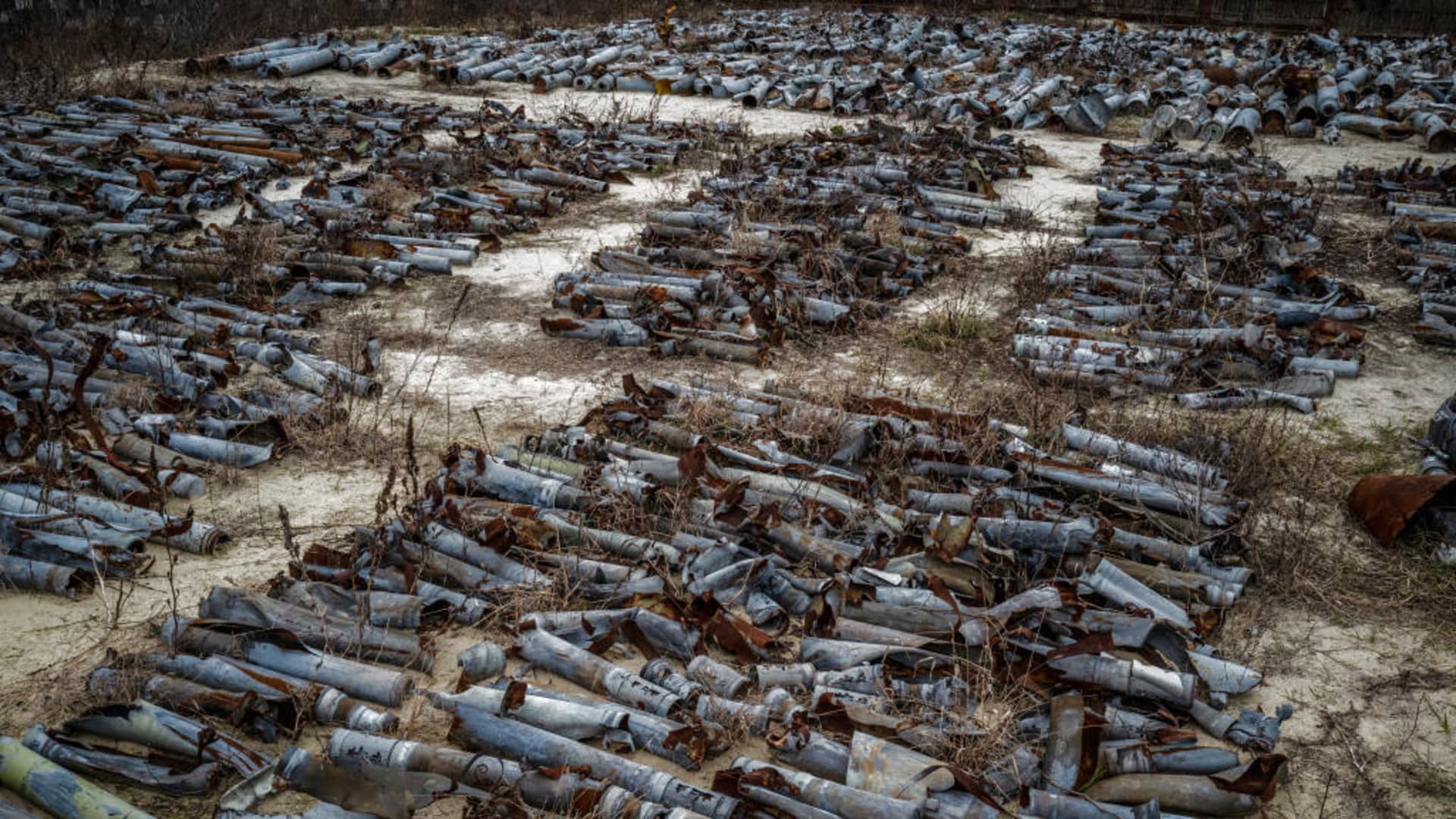
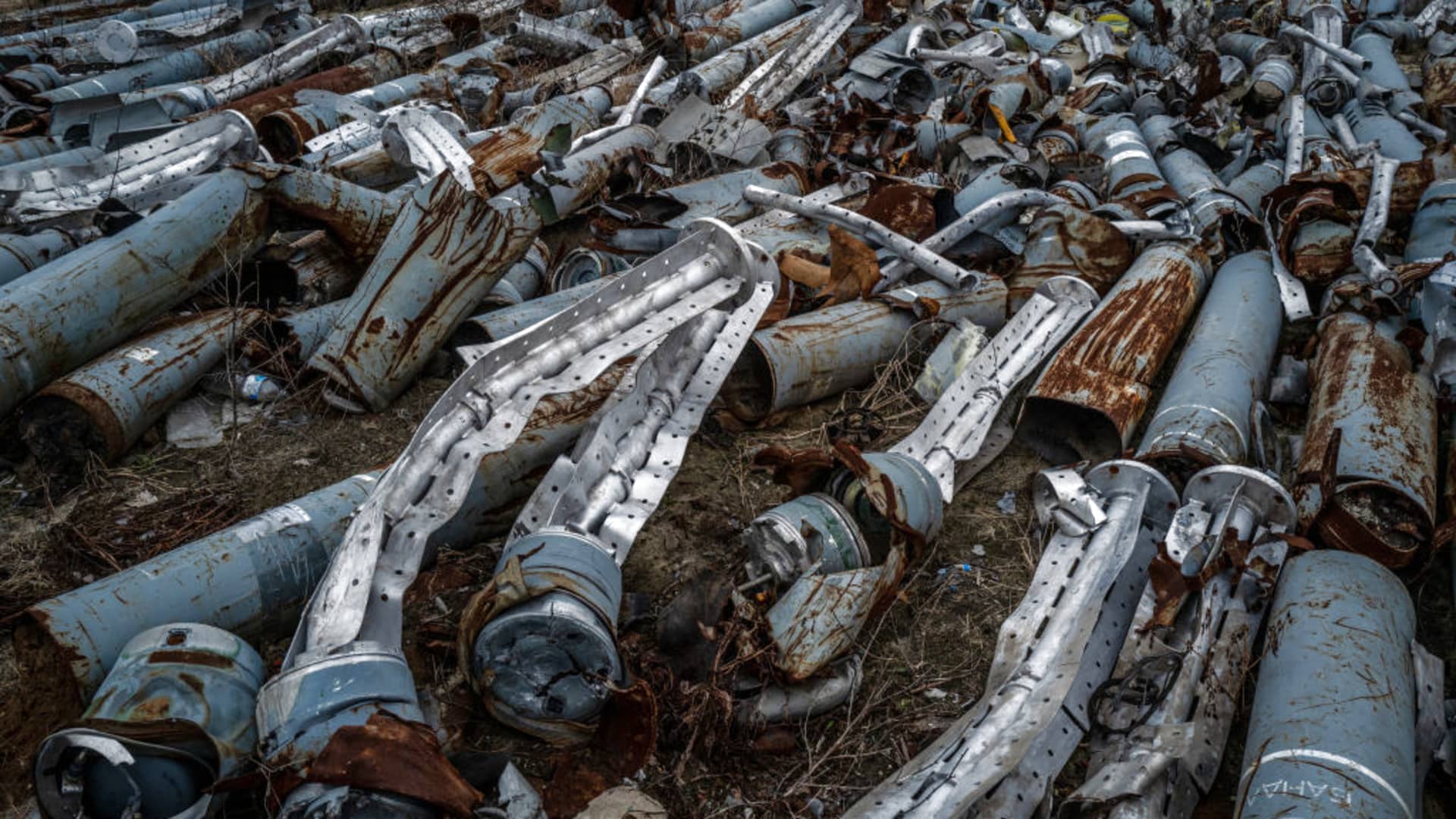
— Wolfgang Schwan | Anadolu Agency | Getty Images
Three ships depart Ukraine’s ports under Black Sea Grain Initiative
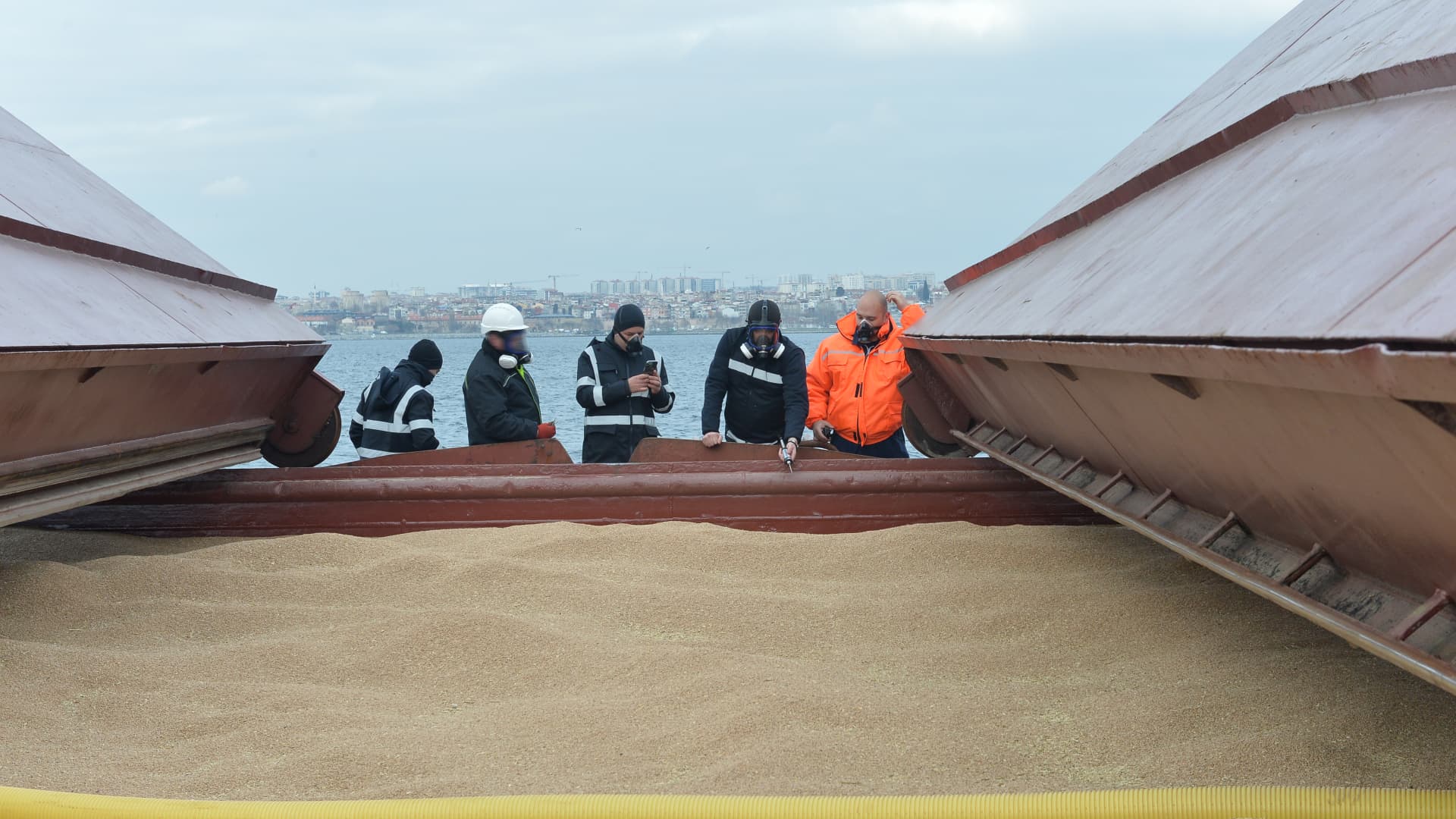
Three ships carrying 136,766 metric tons of agricultural products left Ukraine's ports of Odesa and Chornomorsk.
The vessels are destined for China and Turkey and are carrying corn and wheat.
The Black Sea Grain Initiative, a deal brokered in July among Ukraine, Russia, Turkey and the United Nations, eased Russia's naval blockade and saw three key Ukrainian ports reopen. The deal was extended this month for 120 days.
So far, more than 700 ships have sailed from Ukrainian ports since the deal began.
— Amanda Macias
Allowing Russians and Belarusians to compete in Olympics is 'an attempt to turn a blind eye to Russia's crimes in Ukraine,' official says
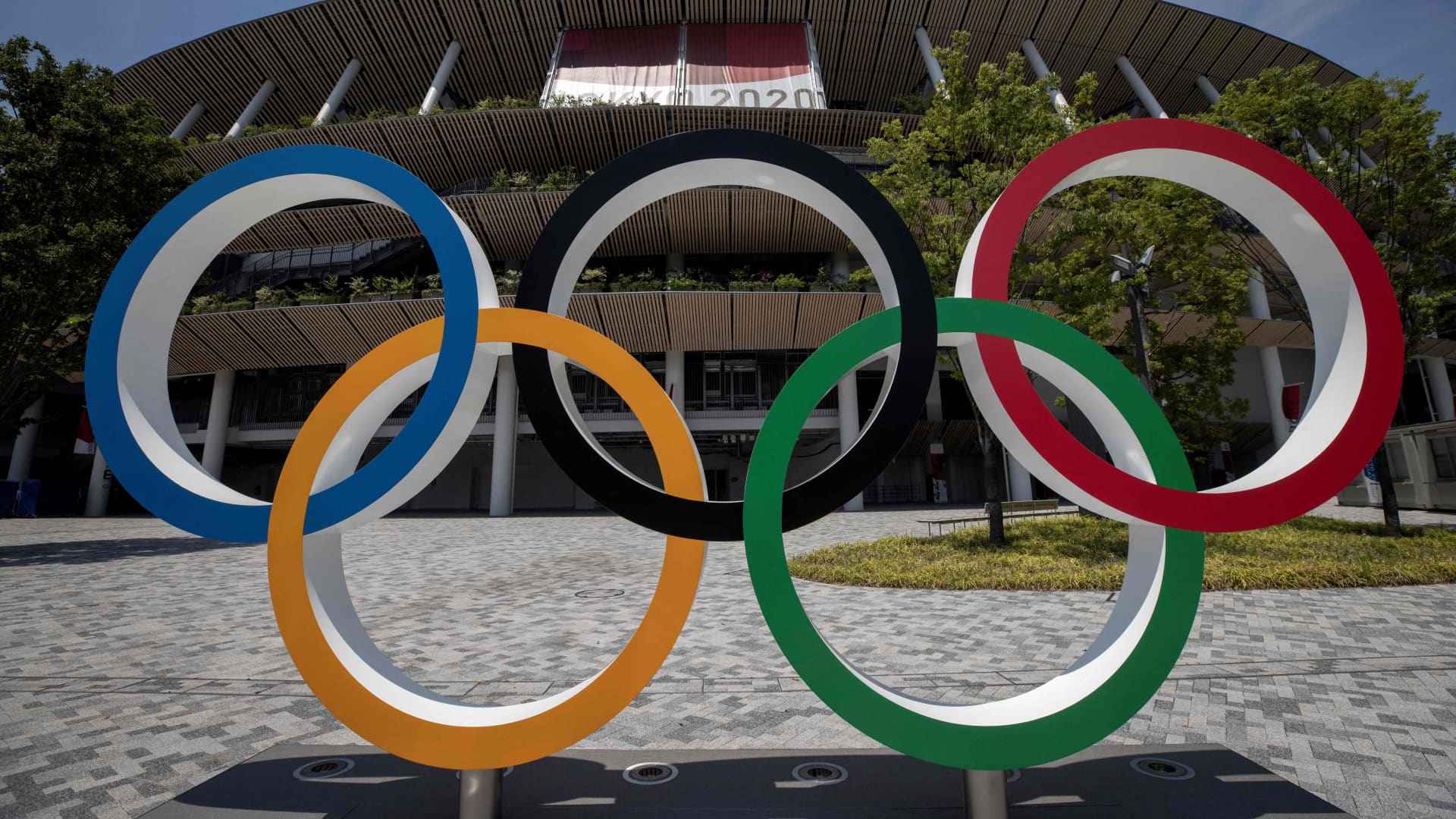
The International Olympic Committee's decision to allow Russian and Belarusian athletes to compete in the Olympic Games is "an attempt to turn a blind eye to Russia's crimes in Ukraine," said Dmytro Lubinets, Ukraine's Parliament commissioner for human rights.
Since Russia invaded Ukraine, more than 260 Ukrainian athletes and coaches have died, Lubinets said. He added on his official Telegram channel that at least 350 sports facilities were destroyed or damaged.
— Amanda Macias
'Let him go,' Biden says to Russia following detention of WSJ reporter
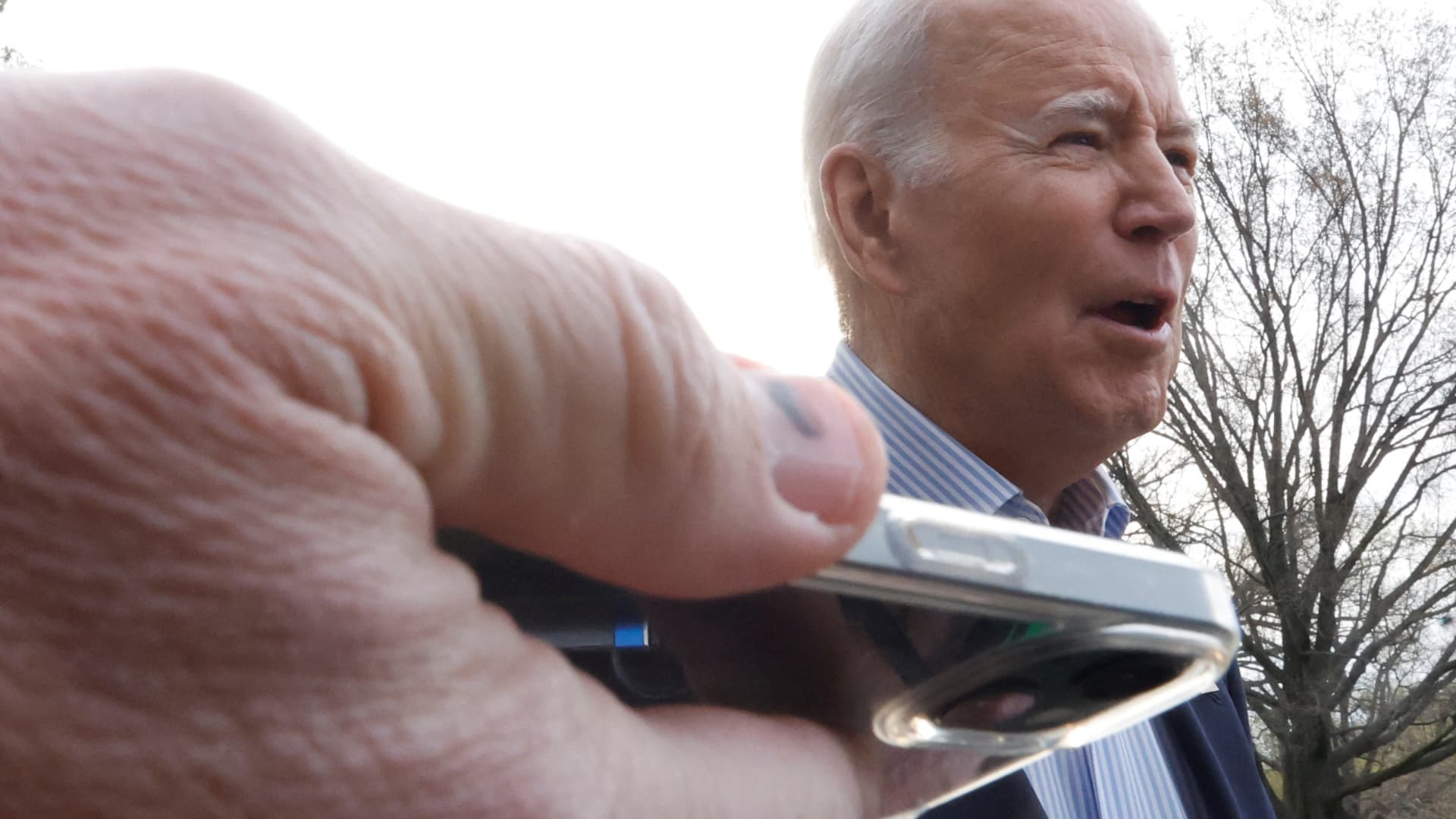
President Joe Biden called on Russia to release U.S. citizen and Wall Street Journal reporter Evan Gershkovich, who was detained on Thursday on accusations of espionage.
"Let him go," Biden told reporters when asked what his message was to Russia.
Senior Biden administration officials spoke to Gershkovich's family following the arrest, the White House said.
Secretary of State Antony Blinken on Thursday said the U.S. State Department is seeking immediate consular access to Gershkovich.
— Amanda Macias
Moldova extends its state of emergency by 60 days, citing Russian threats
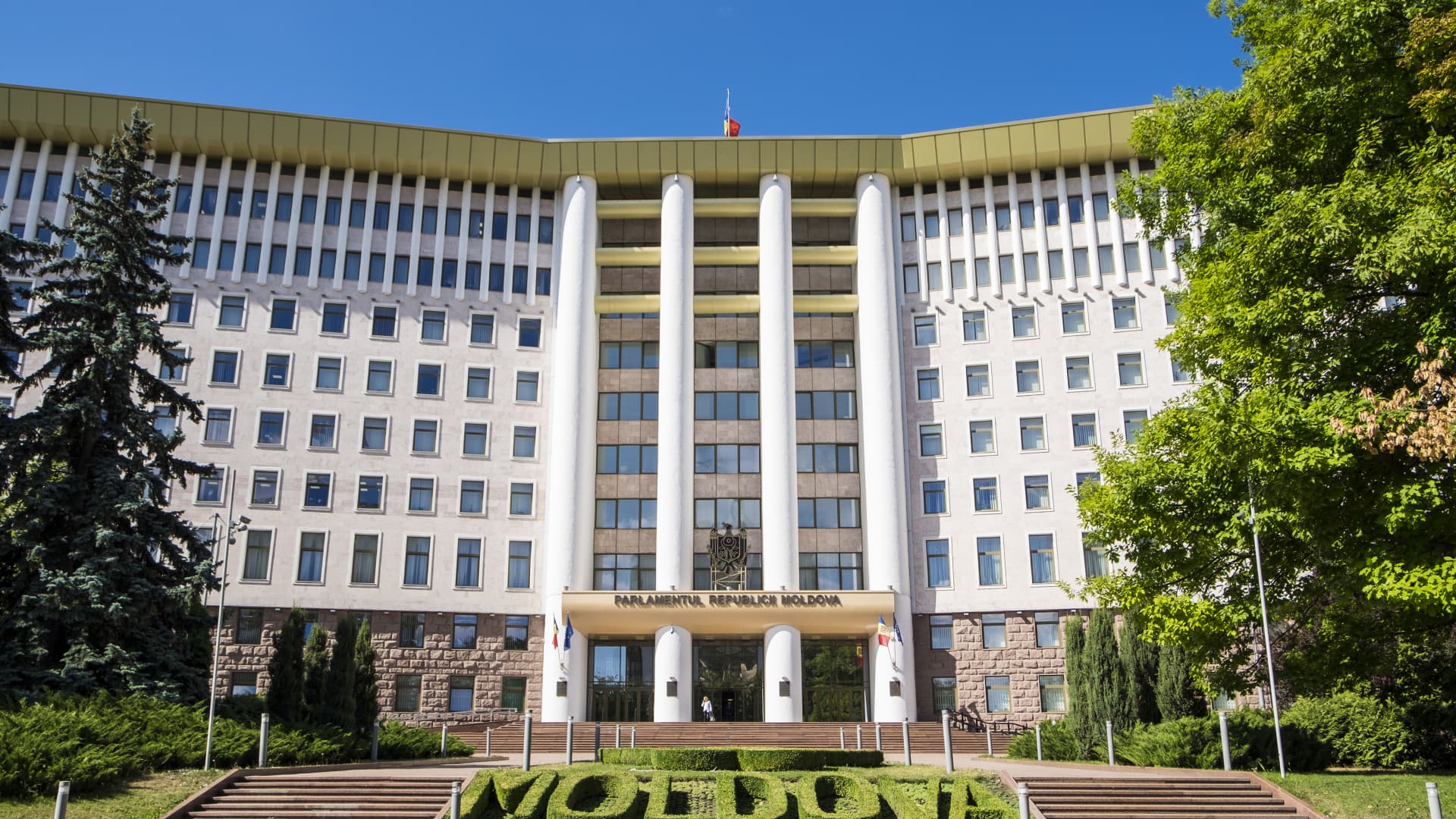
Moldova's Parliament voted to extend its state of emergency by 60 days in response to what the government deemed to be persistent threats from Russia's "hybrid war."
"The extension of the state of emergency is a necessary constitutional tool because we are still facing elements of Russia's hybrid war against the Republic of Moldova," Moldovan Prime Minister Dorin Recean said in televised comments before the vote.
Moldovan President Maia Sandu warned in February of what her government believed to be Russian plans to carry out a coup d'etat and put the country "at Russia's disposal."
A small European country on Ukraine's western border, Moldova has suffered political and economic upheaval amid the war, including within its separatist, pro-Russian breakaway state of Transnistria. It is a landlocked country, and one of Europe's poorest.
Moldova has however strengthened ties with the West in recent years, and received EU candidate status last June, on the same day as Ukraine — something that has angered Moscow, which sees the post-Soviet country as being within its sphere of influence.
— Natasha Turak
Norway says its sovereign wealth fund is still not able to divest from Russia
Norway's massive sovereign wealth fund has not been able to divest from Russia more than a year after the full-scale war in Ukraine began, the Norwegian finance ministry said.
Olso decided it must divest from its Russian holdings shortly after Russia invaded Ukraine in February 2022, but says that sanctions impacting the bank it uses have prevented it from doing so.
"The concrete and practical problem is that the custodian bank that we use is under sanctions, and can't assist us with settlement of transactions, and neither with voting on shares" in Russian companies, the fund's deputy chief executive officer, Trond Grande, said in late January. "So therefore the situation is deadlocked. There is no way we can either sell or buy or vote on these shares."
Norway's sovereign wealth fund, which at $1.3 trillion in assets is one of the largest in the world, holds shares in 47 Russian companies and some state bonds, which at the end of 2021 were worth a cumulative $2.4 billion, according to Reuters. Bloomberg reported in January 2023 that the value of the holdings had dropped to $292 million.
"The market for trading in Russian financial instruments is still subject to comprehensive sanctions and has not been normalized as of March 2023," Norway's finance ministry said in a document Friday.
— Natasha Turak
Wimbledon allows Russian and Belarusian players back into tournament in ban reversal
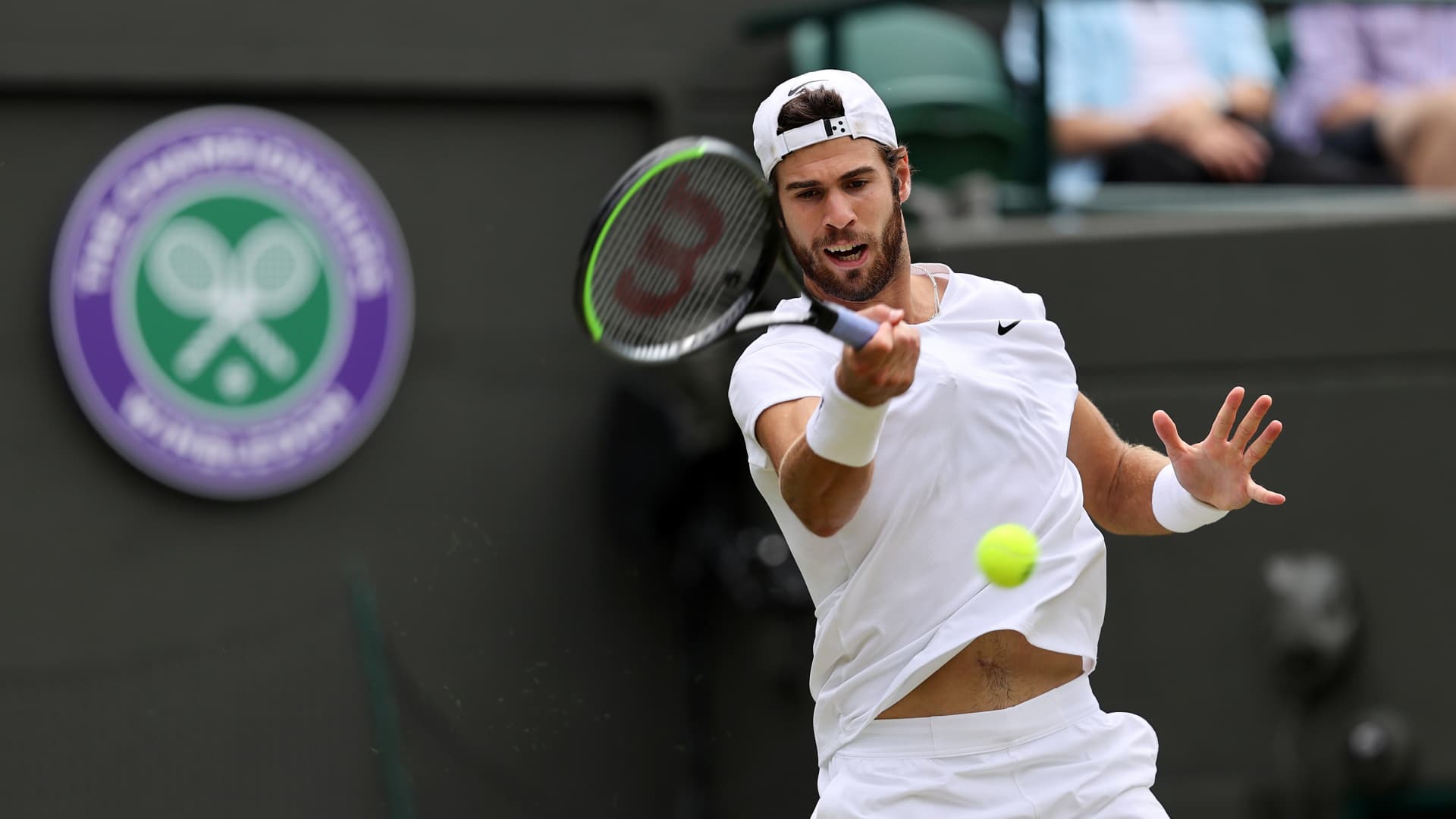
In 2022, Russian and Belarusian athletes were barred from competing at the Wimbledon tennis tournament in response to Russia's invasion of Ukraine.
The Lawn Tennis Association (LTA) and All England Club (AELTC) announced the reversal of the bans on Friday, allowing citizens of the two countries to partake if they compete as "neutral" athletes and comply with certain conditions. Those conditions include signing a declaration of neutrality that would forbid them from expressing support for Russia's invasion of Ukraine, accepting funding from Russia or Belarus, or receiving sponsorship from organizations linked to those governments.
The LTA had been hit with fines as a result of the previous ban, and said if it stayed in place, there was "a real prospect of the termination of our membership" which would cancel its events in other parts of the UK.
Ian Hewitt, chairman of AELTC, said: "We continue to condemn totally Russia's illegal invasion and our wholehearted support remains with the people of Ukraine. This was an incredibly difficult decision, not taken lightly or without a great deal of consideration for those who will be impacted."
"It is our view that, considering all factors, these are the most appropriate arrangements for The Championships for this year," he said, adding that "if circumstances change materially between now and the commencement of The Championships, we will consider and respond accordingly."
Read the full story here.
— Natasha Turak
NATO's Stoltenberg hopes to welcome Sweden into the alliance 'as soon as possible'
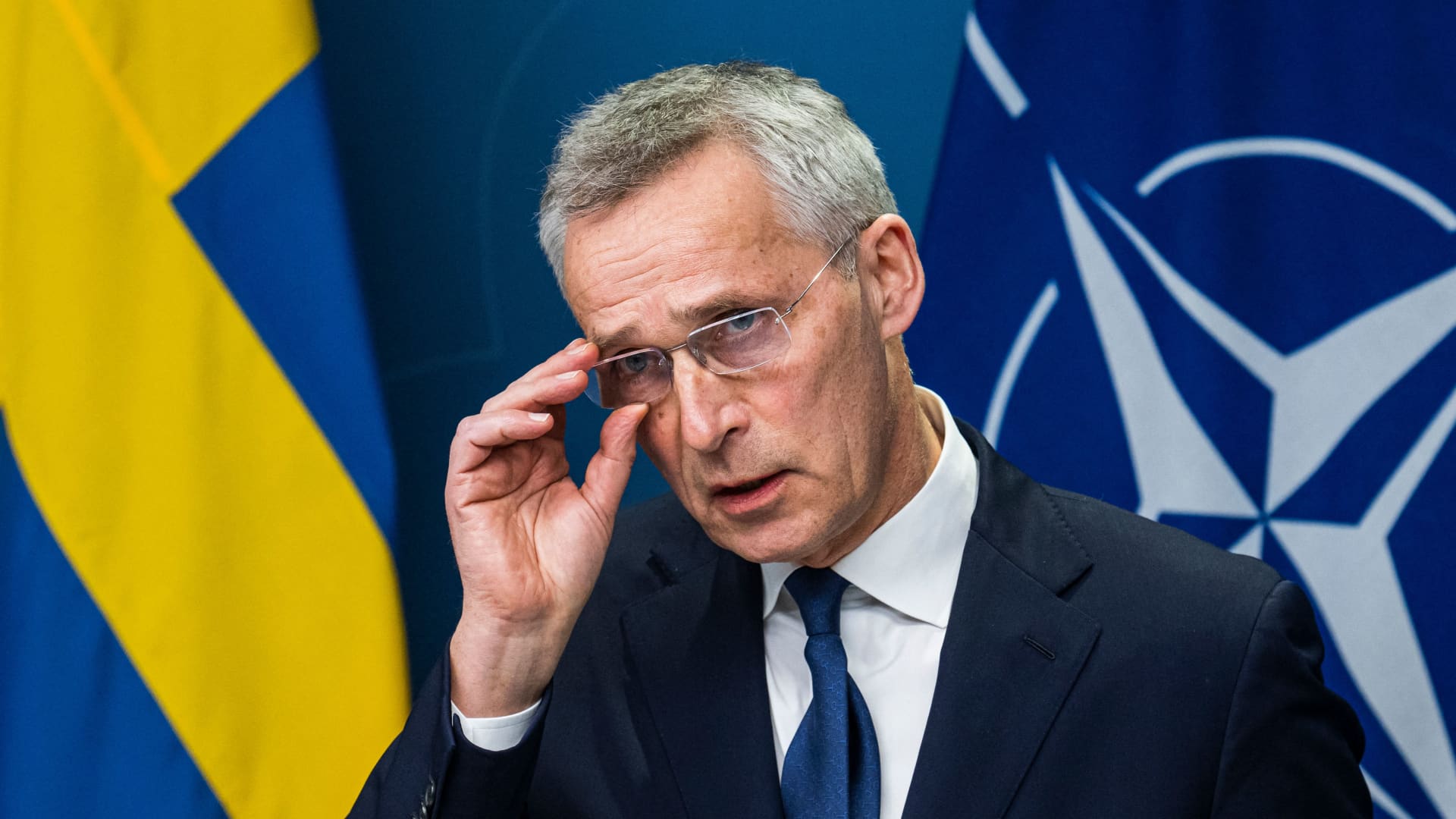
NATO Secretary-General Jens Stoltenberg said he looks forward to "also welcoming Sweden as a full member" of the defense alliance "as soon as possible," following Turkey's ratification of Finland's NATO membership on Thursday night.
The unanimous vote of approval from Turkey's parliament follows a months-long saga that saw Turkey demand certain concessions from Finland and its neighbor Sweden, both of whom applied to NATO in May 2022 in the wake of Russia's full-scale invasion of Ukraine. Joining NATO requires unanimous approval from all member states.
Turkey and Hungary remained the final holdouts standing in the way of the Nordic states' accession to the 74-year-old alliance. Ankara and Budapest this week gave Finland the green light, but have yet to approve Sweden's membership bid.
Turkey's animosity toward Sweden centers mainly on Sweden's support for Kurdish groups that Ankara considers to be terrorists or affiliated with militants.
"Turkey both confirms that we have done what we said we would do, but they also say that they want things that we cannot or do not want to give them," Swedish Prime Minister Ulf Kristersson said in early January. Nonetheless, he expressed confidence that Turkey would approve his country's NATO bid.
— Natasha Turak
Belarusian leader Lukashenko says Russia's tactical nuclear weapons will protect it from western invasion
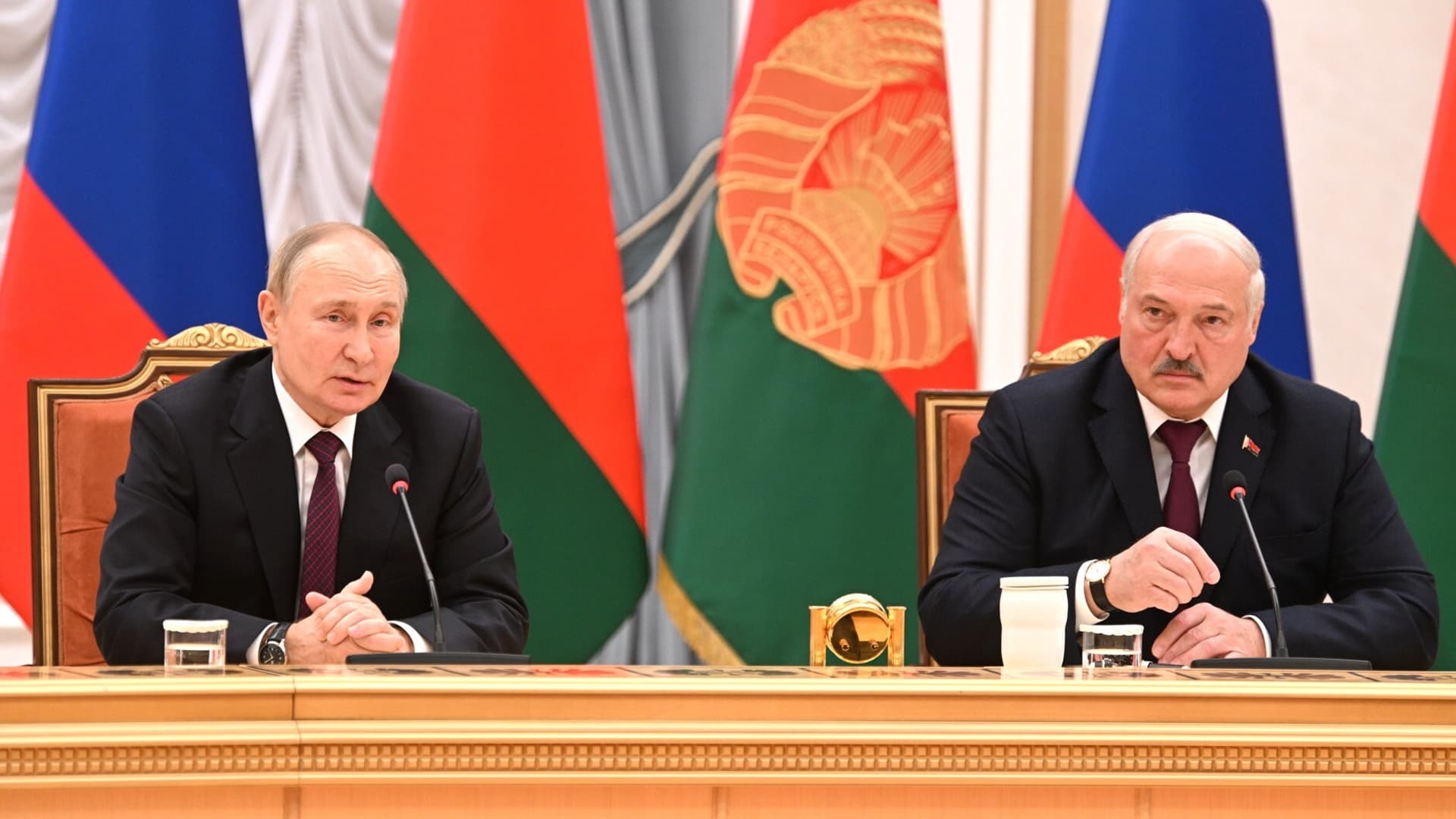
Belarusian President Alexander Lukashenko praised Russia's announcement last week that it would position tactical nuclear weapons in Belarus, saying it would protect his country from a Western invasion.
Lukashenko claimed that NATO's troops and activities in Poland are in preparation for an invasion of his country.
"Take my word for it, I have never deceived you. They are preparing to invade Belarus, to destroy our country," he told lawmakers in an annual address.
If Russian President Vladimir Putin follows through with his announced plan, it would mark the first time that Russia deploys nuclear weapons outside of its borders since the Soviet Union fell in 1991.
Lukashenko has been in power for 28 years and regularly crushes dissent, arresting and killing political opponents, according to Belarusian activists and rights groups. Russia has in the past helped the Belarusian leader in quelling dissent, supplying manpower and equipment.
Lukashenko has so far been a staunch supporter of Putin, allowing Belarus to be used as a staging ground for the Ukraine invasion and hosting tens of thousands of Russian troops. Belarus has refrained from joining Russia in combat operations in Ukraine so far.
— Natasha Turak
Japan imposes new export bans on steel, aluminum and aircraft going to Russia
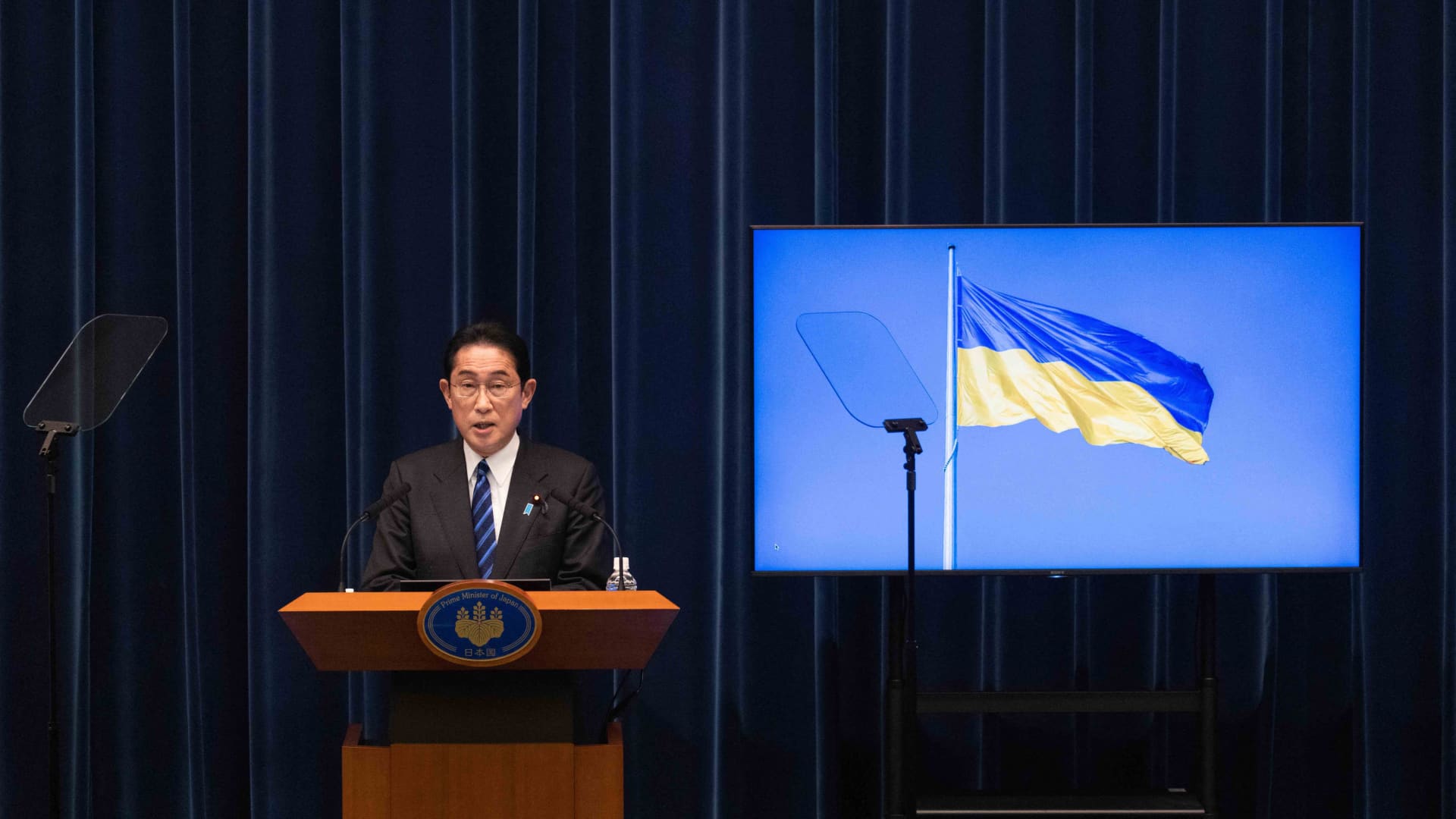
Japan's trade ministry announced export bans on aluminum, steel and aircraft to Russia, including drones.
The bans will also prevent Japanese businesses and entities from exporting a range of industrial equipment to Russia, including ship engines, optical devices and construction machinery, the ministry said in a statement. They will go into effect on April 7.
Japan has been a consistent supporter of Ukraine in its fight against Russia, and in February announced a $5.5 billion aid package for the country. It has also provided Ukraine $520 million in loans for emergency economic assistance, and earlier in March Japanese Prime Minister Fumio Kishida made a surprise visit to Kyiv to meet with Ukrainian President Volodymyr Zelenskyy.
— Natasha Turak
Ukraine and Russia are consistently targeting each other's counter-battery radars: UK MoD
Ukrainian and Russian forces are both working to take out each other's counter-battery radars, Britain's Ministry of Defense wrote in its daily intelligence update on Twitter. Counter-battery radars, also called Cobra, are the radar systems that detect artillery fire from mortars, howitzers, rocket launchers and other guns and use those trajectories to determine the locations of the weapons that fired them.
"Efforts by both sides to neutralise their opponent's counter-battery radars have been a constant element of the conflict. These systems are relatively few in number but are a significant force multiplier," the ministry wrote. "They allow commanders to rapidly locate and strike enemy artillery."
The radars are vital in combat but also more vulnerable to being targeted because of their electromagnetic signature.
"Russia has lost at least six ZOOPARK-1M [counter-battery radars] and likely only has a very limited number left in Ukraine," the ministry said.
"Regenerating counter-battery radar fleets is likely a key priority for both sides, but Russia will likely struggle because the systems rely on supplies of high-tech electronics which have been disrupted by sanctions."
— Natasha Turak
Ukraine marks one year since Bucha massacre
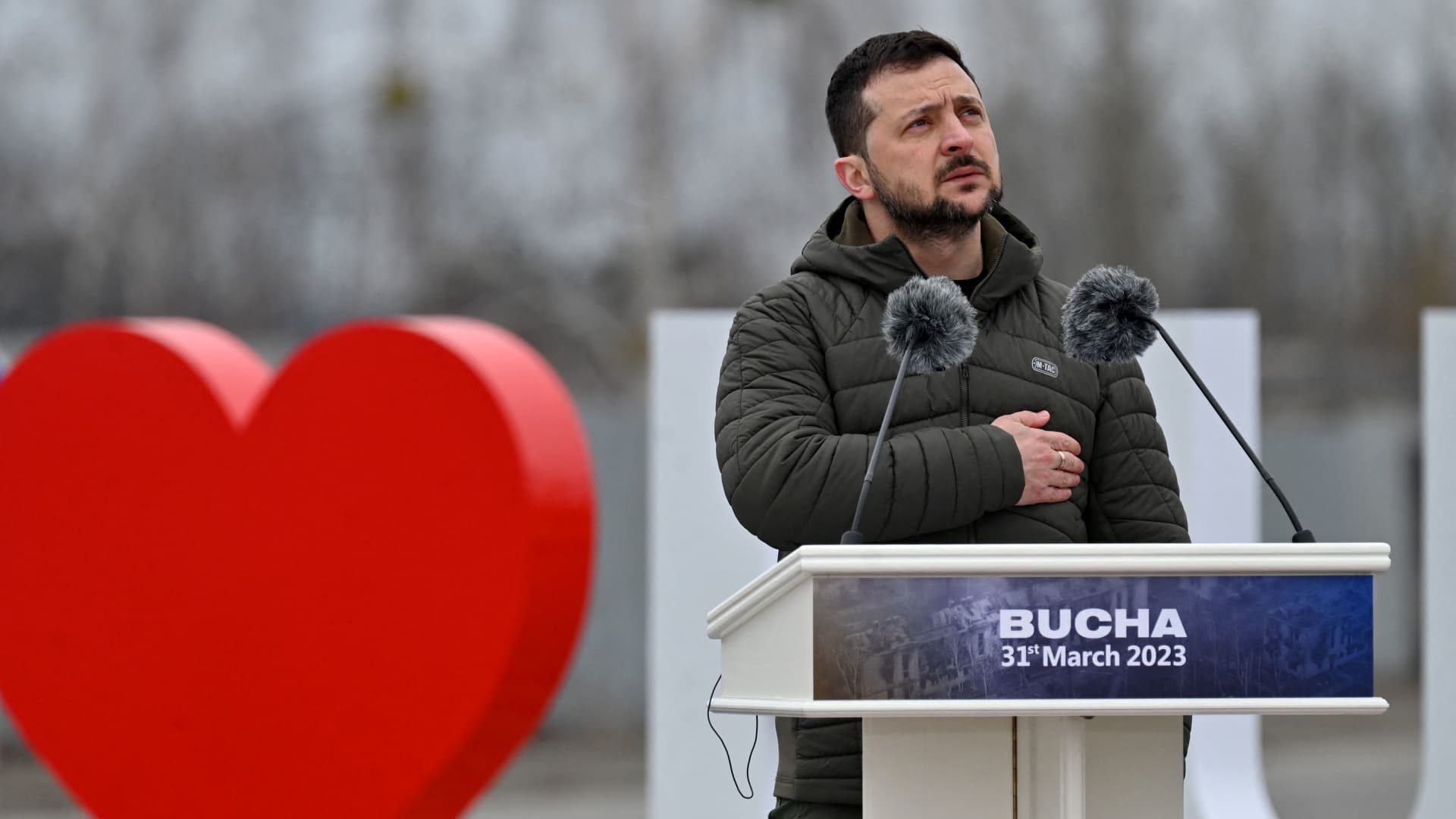
Ukraine is commemorating one year since the Bucha massacre, which saw hundreds of civilians killed by invading Russian forces and left in streets and basements or buried in mass graves in a suburb outside of Kyiv.
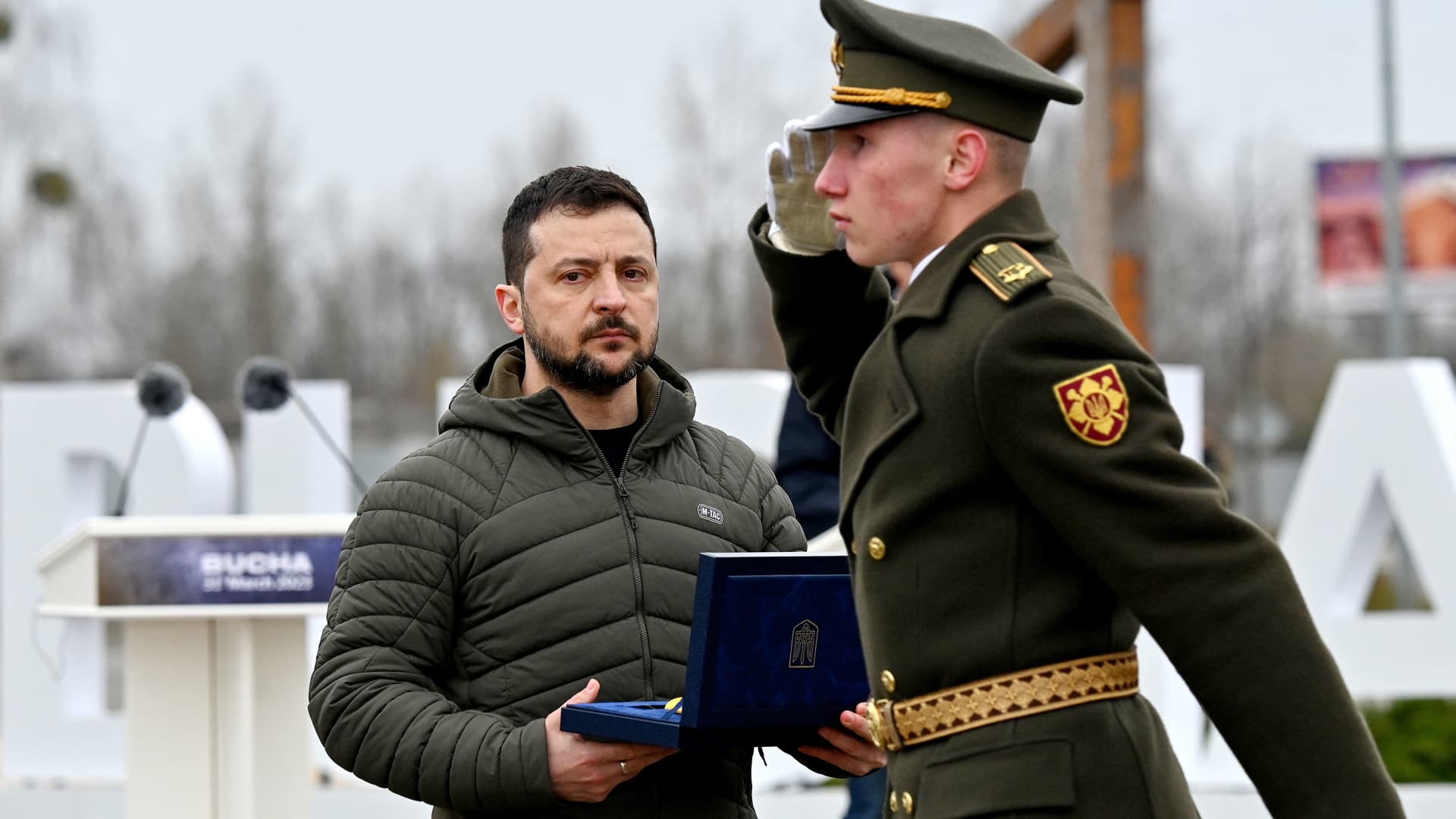
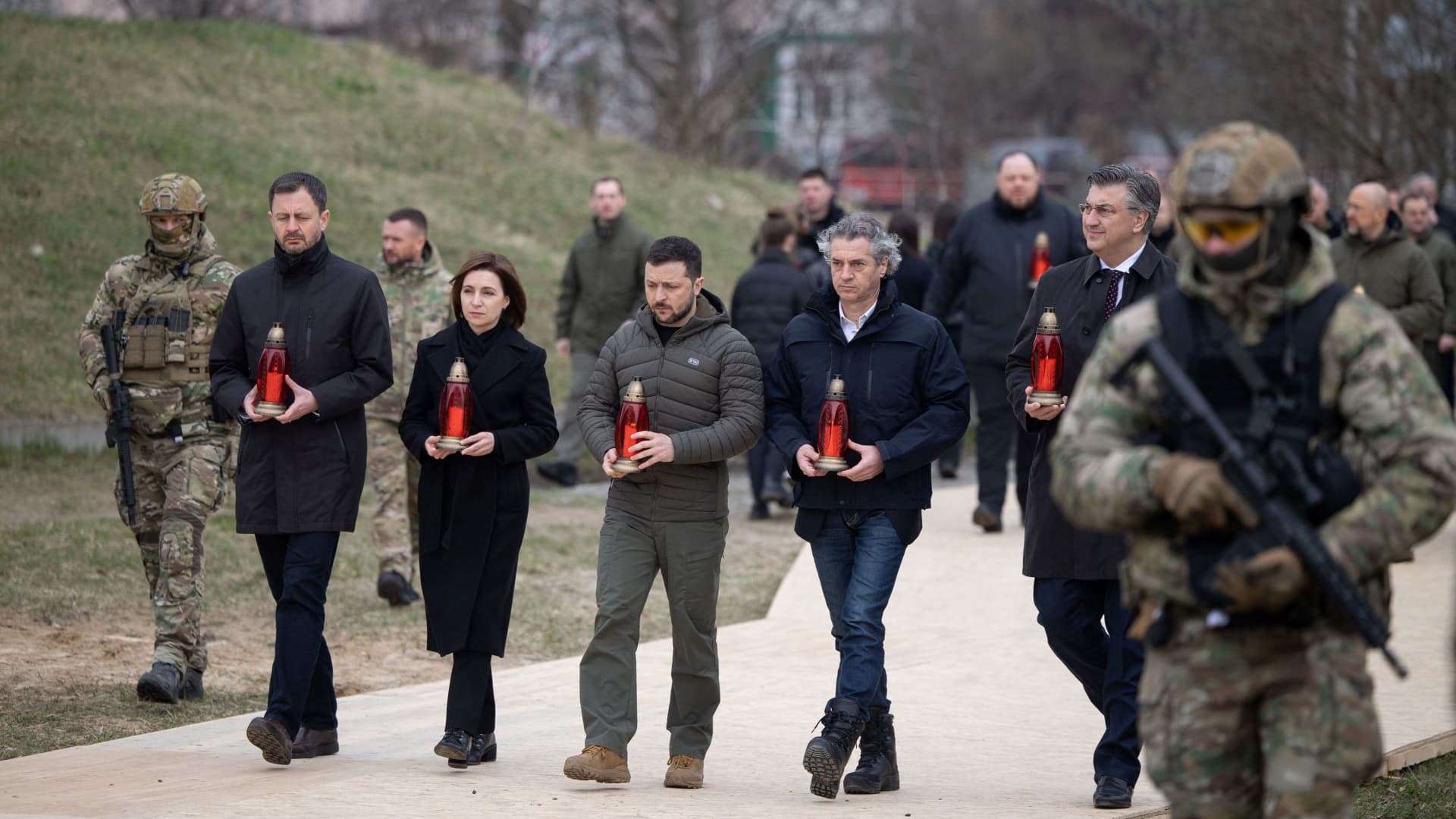
"For many residents of the Kyiv region, the past year has become the most horrific in their entire lives," President Volodymyr Zelenskyy wrote in a post on the Telegram messaging app. "And the liberation of the Kyiv region has become a symbol of the fact that Ukraine will be able to win this war."
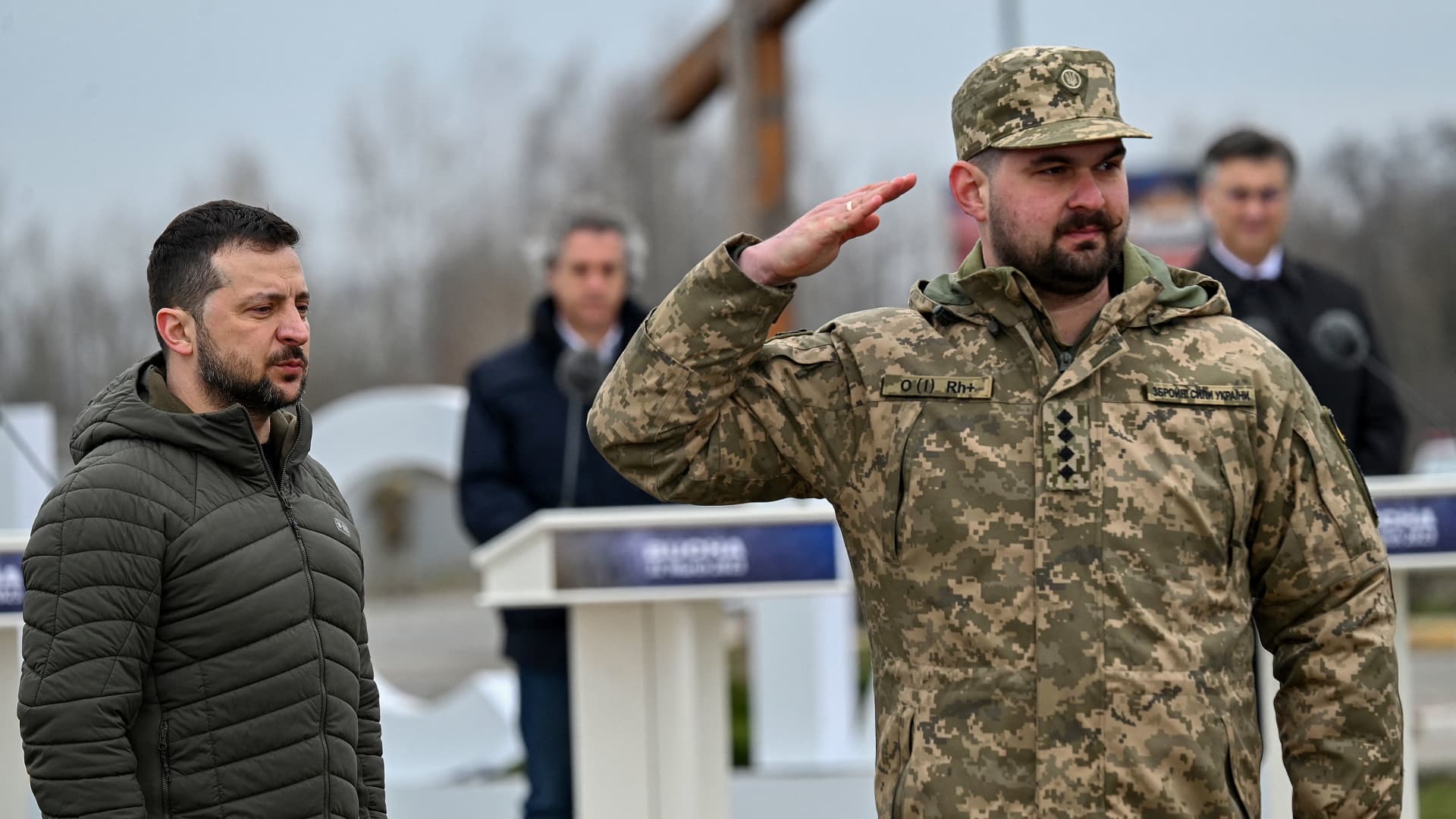

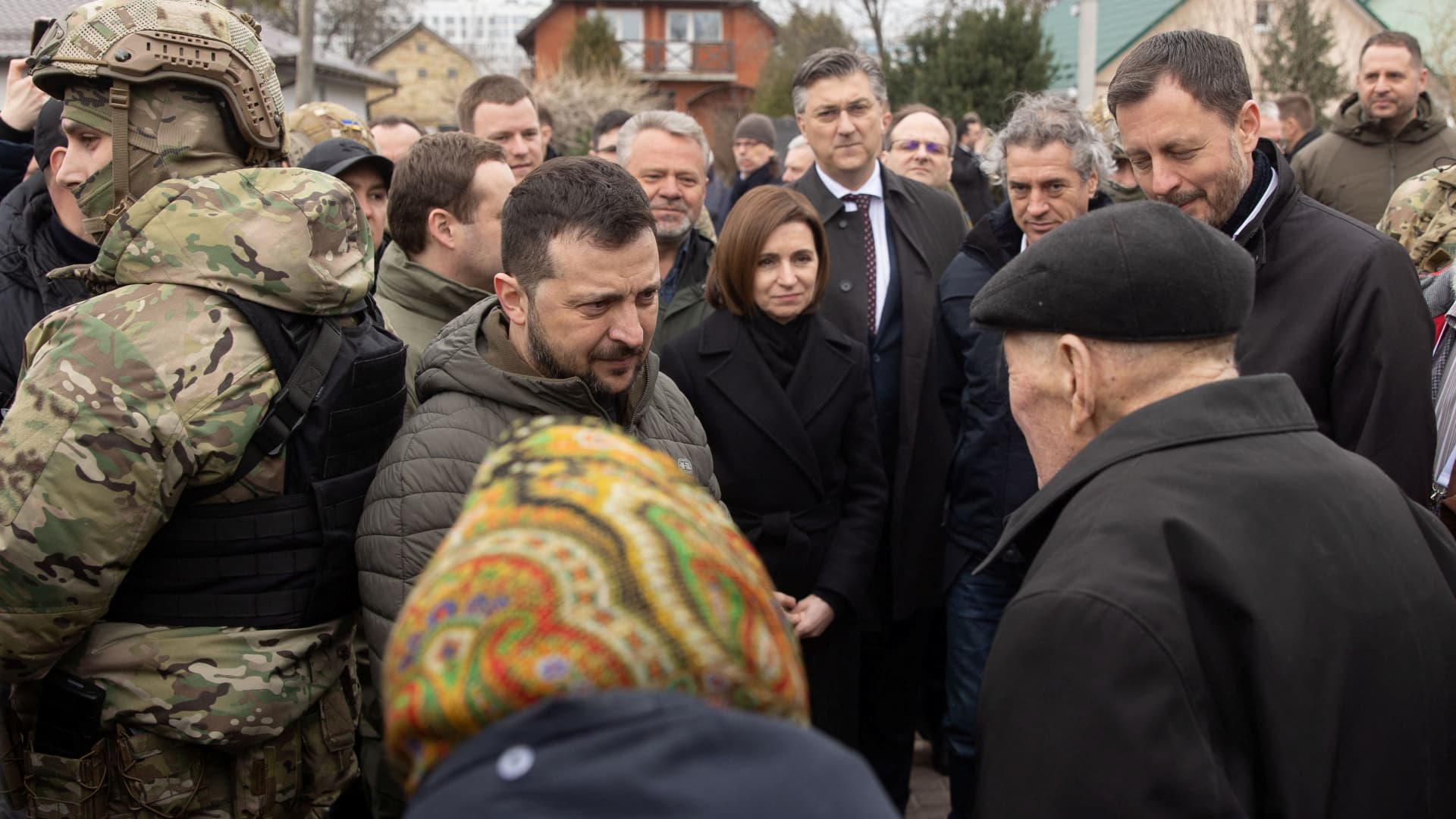
Russian troops gave up on their attempted assault of Kyiv and retreated roughly a month after the initial full-scale invasion on Ukraine began, leaving death and destruction in their wake.
International experts and investigators have spent months gathering evidence in Bucha and other areas where Ukraine says Russian forces carried out atrocities. Moscow denies the accusations.
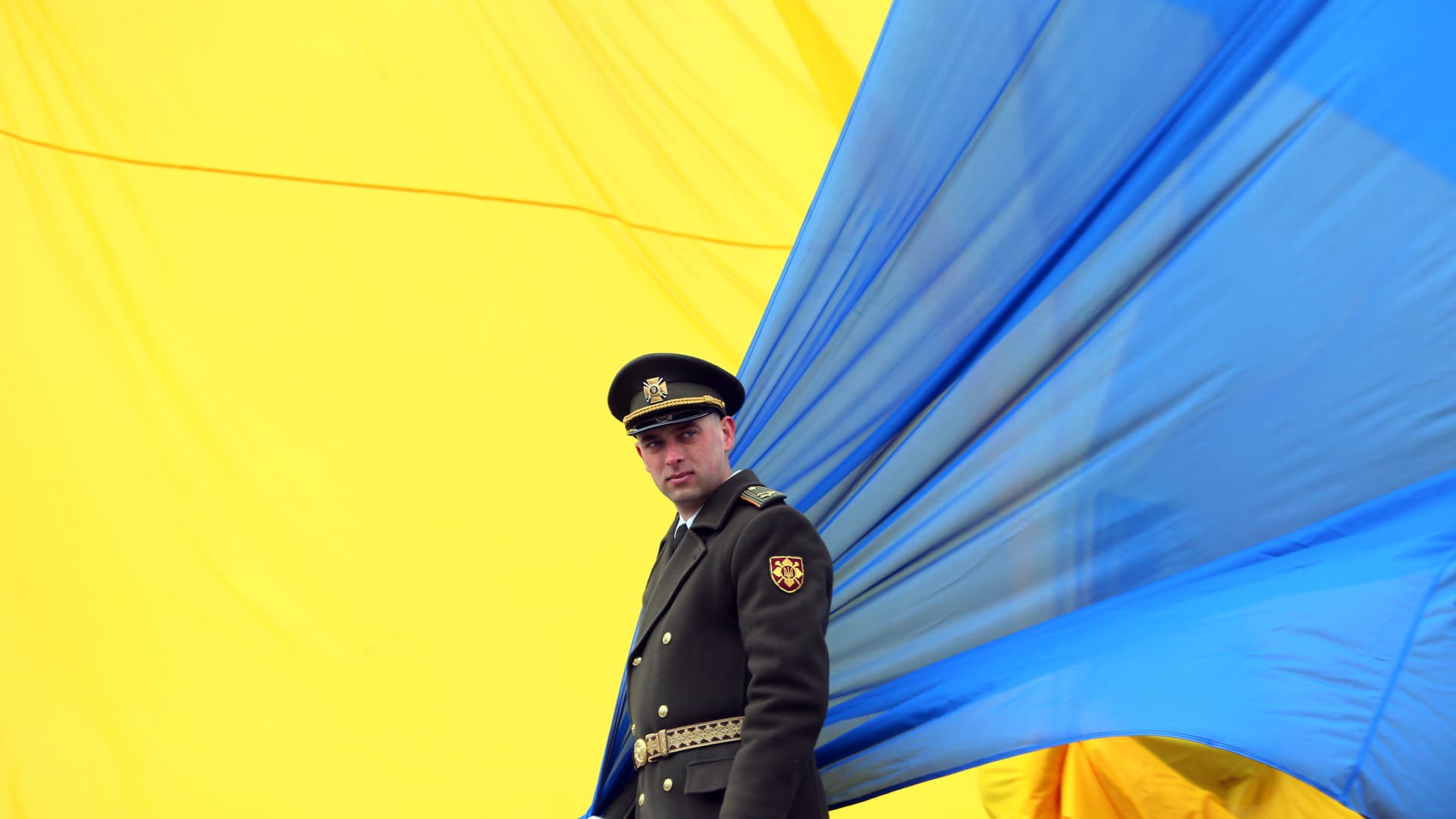
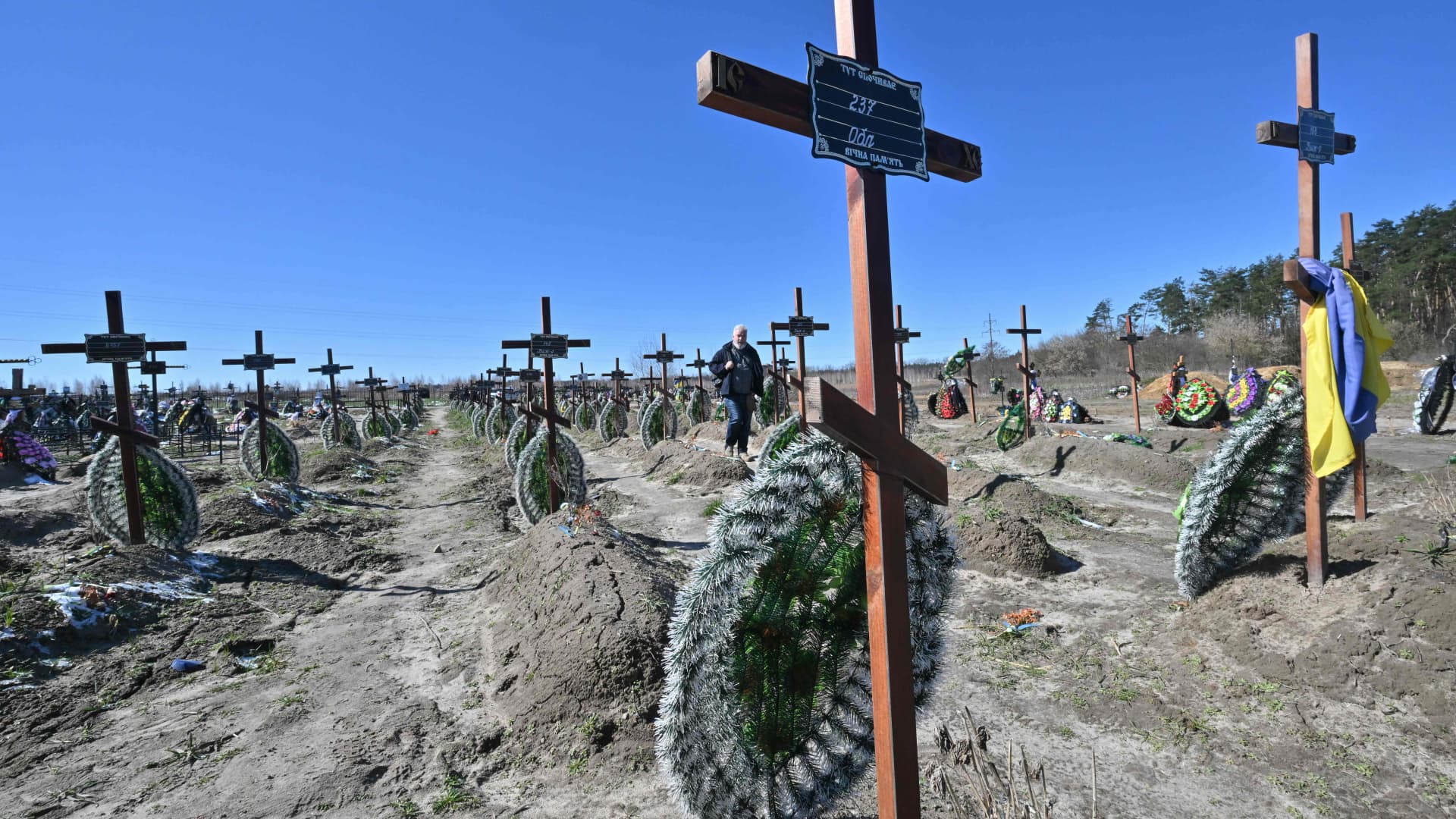
Now, "Bucha is full of life," Reuters reported Friday. "Young families crisscross central streets and the sounds of construction clatter in the crisp spring air." Still, some buildings remain war-scarred, with bullet-ridden fences and destroyed military vehicles a visible part of the town's features.

— Natasha Turak
Turkey formally approves Finland’s NATO membership, in setback for Russia
Turkey's parliament voted unanimously to formally approve Finland's membership to NATO on Thursday, marking a historic step for the traditionally nonaligned Nordic country that shares an 830-mile border with Russia.
The vote follows a months-long saga that saw Turkey demand certain concessions from Finland and its neighbor Sweden, both of whom applied to NATO in May 2022 in the wake of Russia's invasion of Ukraine. Joining NATO requires unanimous approval from all member states. Ankara's vote late on Thursday marked Finland's clearing of its final hurdle in the accession process.
Turkey and Hungary remained the final holdouts standing in the way of the Nordic states' accession to the 74-year old alliance. Ankara has yet to approve of Sweden's membership bid, while Hungary — whose Prime Minister Viktor Orban has been on friendly terms with Russian leader Vladimir Putin — has approved Finland's accession, but not Sweden's.
— Natasha Turak
Zelenskyy addresses Ukraine on 400th day of war
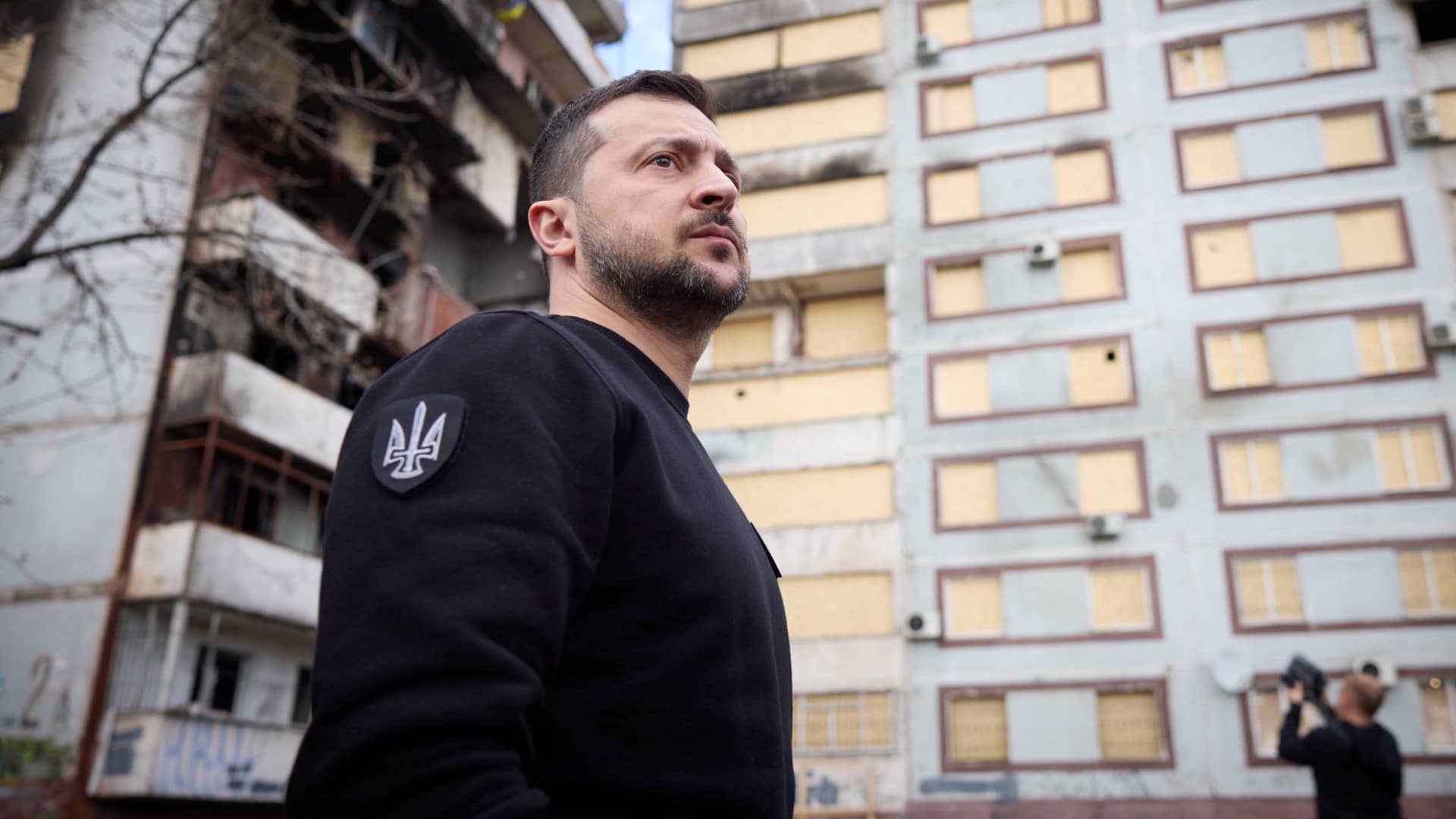
Ukrainian President Volodymyr Zelenskyy said his country was preparing to take back more of the territory seized by Russia during its full-scale invasion.
"This is a colossal path that we have walked all together," Zelenskyy said in a nightly address, marking 400 days of the war.
"We will not leave a single trace of Russia on our land. And we will not leave any enemy unpunished either. We are preparing news about this," he said, without offering other details.
"Today, on the four hundredth day of resistance, full-scale resistance, I want to thank everyone in the world who stands with Ukraine. Who shares our interpretation of freedom. Who supports our pursuit of justice. Who has the same strong conviction that we, Ukrainians, have... the conviction that the world should be based on rules, on civilized rules - on the rules of humanity, respect and peace. That is why Ukraine will win," he added.
— Amanda Macias
Russia seeks arms-for-food deal with North Korea, White House says
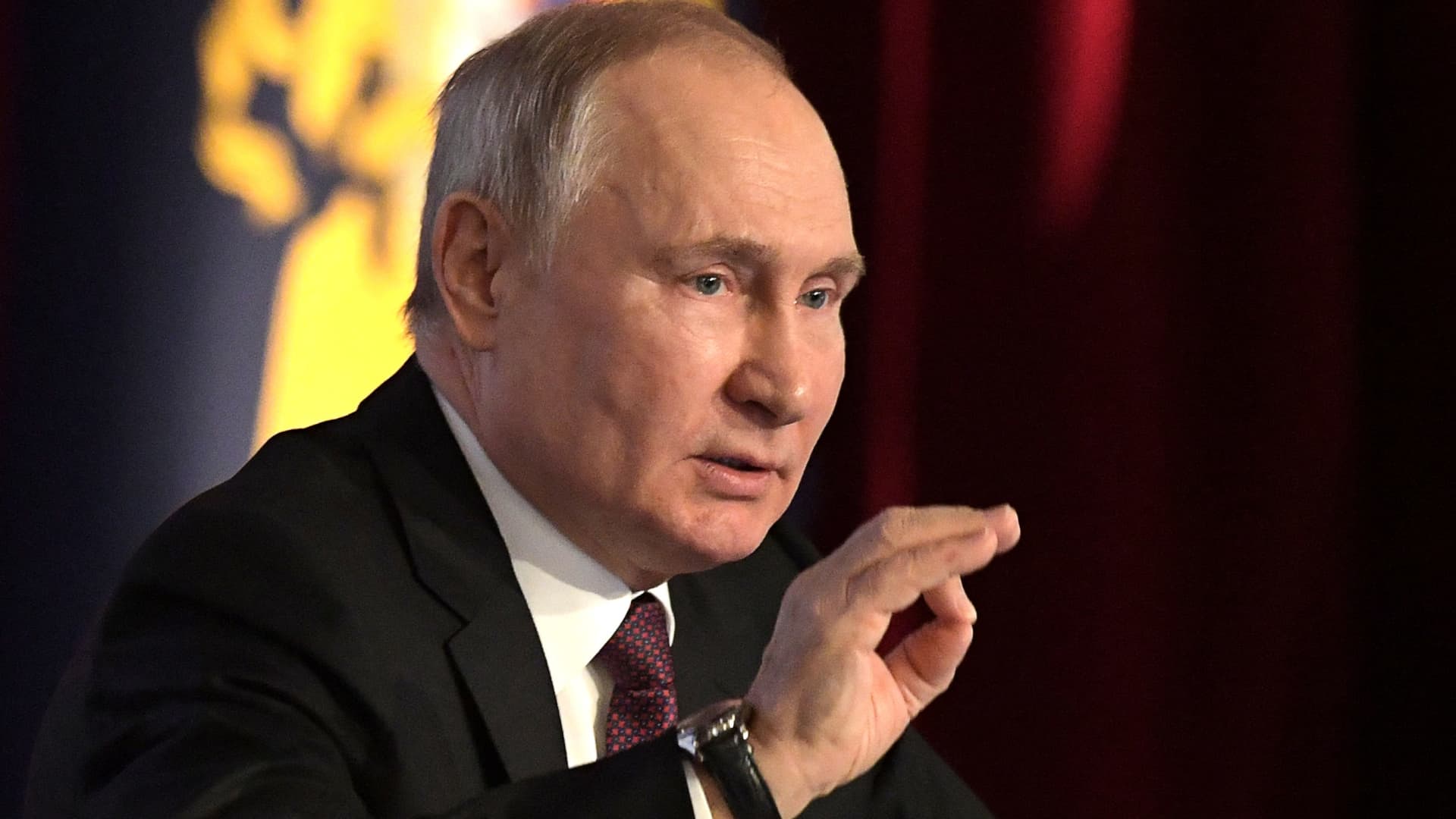
The White House said it has new evidence that Russia is looking again to North Korea for weapons to fuel the war in Ukraine, this time in a deal that would provide Pyongyang with needed food and other commodities in return.
It's the latest accusation that Russia, desperate for weaponry and restricted by sanctions and export controls, is turning to "rogue" nations to help it continue to prosecute the 13-month-old war.
"As part of this proposed deal, Russia would receive over two dozen kinds of weapons and munitions from Pyongyang," White House National Security Council spokesman John Kirby said. "We also understand that Russia is seeking to send a delegation to North Korea and that Russia is offering North Korea food in exchange for munitions."
The administration has previously declassified intelligence to present evidence that Iran sold hundreds of attack drones to Russia over the summer and that the Wagner Group, a private Russian military company, has taken delivery of arms from North Korea to help bolster its forces as they fight side-by-side with Russian troops in Ukraine.
— Associated Press
Read CNBC's previous live coverage here:
Kyiv says nearly 500 children have died in Moscow's war; Russia detains WSJ reporter






